TAPE 80/SHF/01
THIS TAPE HAS BEEN RECORDED ON APRIL 11TH 1980 IN THE WRAPPER ROOM AT SPRING VALE MILL, CHARLES LANE, HASLINGDEN. THE INFORMANT IS GLENYS KIRBY, CONDENSER MINDER. THE INTERVIEWER IS MARY HUNTER.
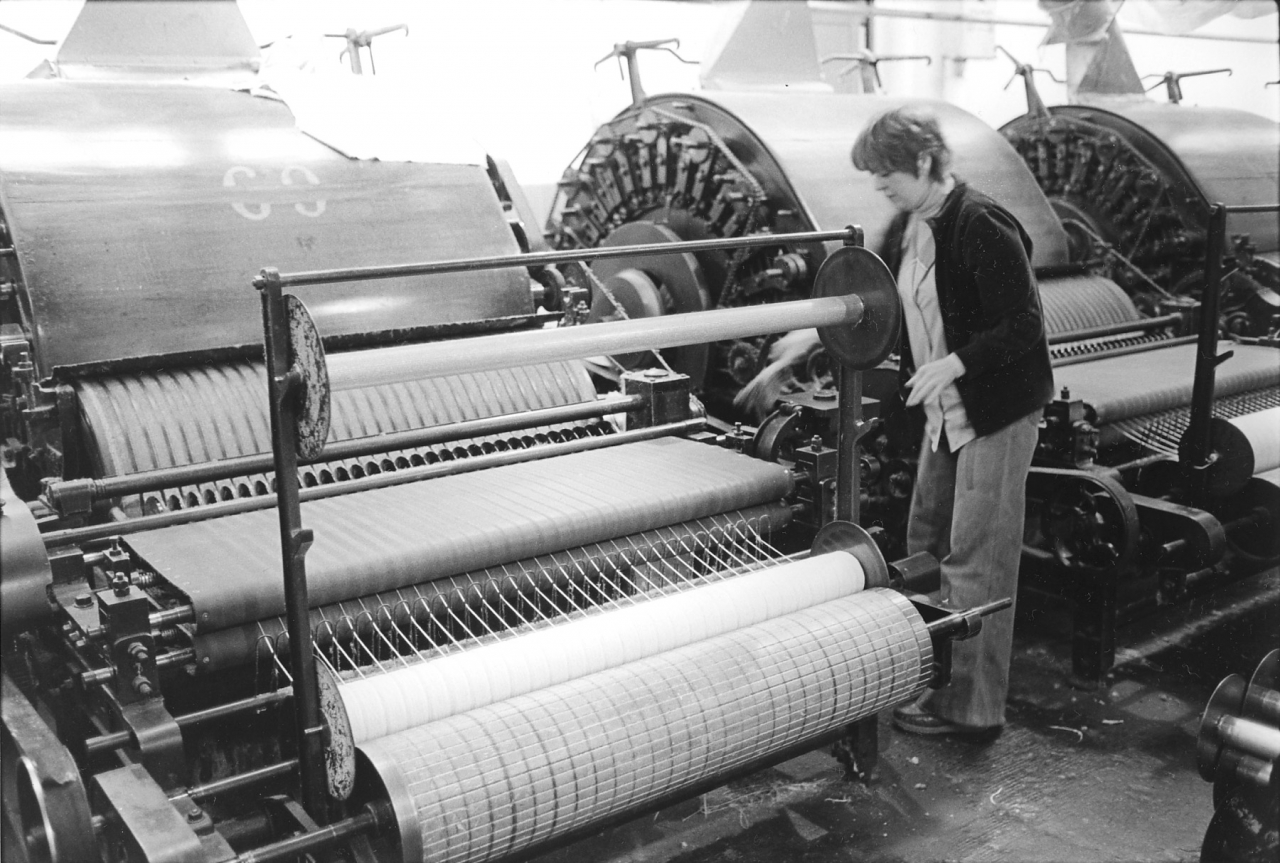
Glenys Kirby cleaning one of her condenser cards at Spring Vale. [ As I do this edit in 2013 I remember that much later in the 1980s when I was doing Ellenroad Engine at Rochdale, Tatham's, the firm that made these cards were very helpful to me and I spent a lot of time at their works. One of the things I learned was that some firms (and Hardman's were one of them) Insisted on a very high finish on the wooden hoods over the card cylinders to make them easier to clean. Up to five coats of varnish went onto them to get a finish that wouldn't have disgraced a grand piano!]
Now then Glenys, have you always worked at Spring Vale?
R- No.
Where did you work before you came here then?
R - Rossendale General Hospital.
Oh, so you haven’t always been in spinning?
R- No.
What did you do at the hospital?
R- Nursing Auxiliary.
And how long did you do that for?
R- Seven years.
From leaving school?
R- No.
Come on then, tell me.
R- I went in the cotton mill when I left school. I didn't want to, I wanted to go nursing then but I had to go in the cotton mill because we had a big family and I was the oldest and me mother needed the money you know.
And the cotton industry then was better money?
R- Than nursing yes. Yes definitely very poor money when I left school in the nursing career. I forget just what it were you know but it wasn’t very much at all.
So you did that for how long, nursing? Did you say seven years?
R – Yes, but I was married then. I went into cotton from leaving school up to getting married.
What did you do in the cotton industry first of all then?
R- Doffing for ring spinners.
So you haven’t always been in the condenser trade?
R – No. But I've done that a lot you know. I went doffing for the ring spinners first and then I went condensing. I learnt that at Flash Mill before this firm that has it now took it over, condensing.
So you've always been here when you have been in the cotton industry?
R- No, I worked at Syke Side Mill, that were a cotton mill, when I left school and I worked at Clough End Mill on a Permo spinning unit. I can’t remember where I went when that closed down. I went to Ivanovich’s (?) candlewick bedspreads then, folding there for a while. Then I got married and didn’t work for about twelve months I think and then I went back to Syke Side, condensing again. Then I went working up at the hospital like I said and then I came back here. I’ll have been seven years now in September.
So you’ve got your chance to go back nursing. So what stopped you after seven years?
R – Well. It were week ends more than anything, the children were young you know and we seemed to be working more and more week ends. It weren’t really working in with family life. Me husband were working all week and then he were having to mind the children all week end while I worked up there so I decided to pack it in for a while. Maybe me being made redundant, I might go back you know.
(100)
Good for you. And your children being that much older?
R- Oh yes, Collette, me daughter is seventeen and my son’s fifteen so…
Well you’ve got a chance now haven’t you. When you were in the cotton industry before you were married you were mainly in the spinning side, in the spinning room weren’t you?
R- Spinning and condensing, yes.
So when you came here that was the first time you had been in the card room was it?'
R – No, I worked in the card room before at condensing , when I finished with ring spinning.
Were your parents in the spinning industry?
R- No, me father were a weaver and me mother worked in the sewing room.
In the manufacturing, clothing manufacturing industry?
R - In a cotton mill.
Go on, tell me what they do in a sewing room.
R – That’s the finishing room like, you know, where they hem all the blankets and all the sheets and put them in cellophane ready for going to the shop or whatever you know.
And presumably your parents are locals to this valley?
(5 min)
R- Yes, we’ve lived here all my life, my parents as well.
Do you think that's what has happened to most people here in the Rossendale Valley? Once they are here they stay here and it’s very much a community sort of a valley or did many people leave?
R - I think it’s a community type valley, you know? I think you could say that anyway. Perhaps a few leave but may be more so now than in time gone by you know. 'Cause it were a prosperous cotton town when I was at school was Haslingden but now there is hardly anything you know, it’s just dying out altogether.
(150)
That’s more or less all there was to do when I left school, cotton mill, slipper works you know and things like that. Unless you had a good education you know? And people tended to have bigger families I think then than what they do now, you know.
Are all your family, by that I mean your relations, in this valley too?
R - No. Me mother lives down at Plymouth now and me sister lives over in Ireland. They were here up to, me sister were here up to recently you know.
Do you think most families will have what's called the extended family, the relations also in the valley you know, with the grandma, the aunts, the uncles?
R- Oh yes, definitely.
So perhaps your family is a bit of an exception to what seems to be normal in Rossendale,
R - Oh yes, very true.
You mentioned something a little while ago about large families and you thought that people in your parents generation had larger families. What sort of difference do you think that made as far as leaving the valley was concerned? Because you mentioned this in that context.
(200)
R - Well, people hadn't the money then to leave the valley you know. I think they were better living days than what there are .. we used to entertain, we used to enjoy ourselves better than children do today, we’d make our own entertainment you know. But these days they don't seem to be able to do, they just want money and they want .. you know, they've always got to have something to do, if they’ve nothing to do they’ll go and vandalise and what have you. Whereas in our days there were no such thing, not much anyway, not much vandalizing and what not because we used to make our own entertainment even in the streets you know when we played out. We’d, we'd make games up and play games and what have you. May be knock on a few doors and run away but I think that didn't harm anybody you know? Not like they, not like they do today.
So although there wasn't that much money you say they were happier days.
R- Definitely yes.
But because of the emphasis on money nowadays you don’t think that children play in the same way they used to.
R - They definitely don't play the same no.
Are your children going to find different jobs to the ones that you and your husband have had?
R - Well me daughter’s hoping to go in the Queen Alexandra’s Royal Nursing Corps, she goes for an exam next week. They’ve passed her application. I don’t think she will go in while she is eighteen though, so that’ll be a year if she passes her exams and her medical.
And your son?
R- I don't know what he’s going to do yet, he is not very clever really. He had bronchial asthma from being young, he missed a lot of school you know. Although he is a lot better now I really don't know what he is going to do.
But they haven’t considered anything to do with textiles?
(10 min)(250)
R- No, I don't want… Me daughter is working in a cotton mill now but it’s a finishing works you know, where they do all sewing, machining and folding sheets. There’s no condensing or spinning or weaving or anything there, it’s just like a finishing place where they raise all the sheets [Process them to raise the nap on the cloth] and so on, fold and [pack them].
Has she ever been down with you to here?
R – Yes. She didn’t think much about it really, she thought it were dirty you know and noisy.
Whereas in fact this is quite a clean mill isn't it?
R - It is, compared to some it is yes. But she didn’t think so you know. That place where she works, I believe that it’s very nice. Light and airy and they have the wireless going where we couldn’t do that anyway because you wouldn’t be able to hear it even if we had it.
And is your husband in the cotton trade?
R- Not now but he used to be a mule spinner, but he works in the building trade now, outside work.
And, and did he change direction because of the decline in the industry?
R - No, I don’t think that was the main reason you know. I think he just felt like he wanted a change. He’s been working outside now for about ten or twelve years, something like that. Well, twelve year ago cotton was still pretty good you know? It’s over this last five, six years that it's been going down fast you know.
What do you think about the atmosphere of the place working here?
R- Oh, it’s happy, we all have a laugh you know because you have to do really otherwise your days would be boring wouldn’t they? You know, just doing the same old thing all the time. We have some fun, we have a good laugh.
Yes, it’s certainly something that impressed me when I first came down here.
R- Everybody is friendly you know. Yes, very friendly.
How important do you think the breaks are when you go and meet in the canteen?
R- I think they are important, because you see people work in different rooms. Well, we all get together then and get to know one another’s little grumbles and problems and all have a laugh you know.
You'd notice that quite a few people in fact don't stay [in the canteen], do they. They come down and get whatever they want and then go again.
R- Well, that’s mostly the mule spinners because they are on piece work you see. They've got to keep the mules going to earn their wage and they can’t stop very long anyway because there's two on a pair, while one’s out brewing up, having a bit of lunch or that it’d be the other one that’s left running both mules you know. So they can’t stop very long if they do stop.
Is It just the mule spinners that are on piece work there?
R- Yes, at this mill.
And is there much overtime here?
R- There is none now, but there used to be for the men you know. For the devil hole and blending room, they used to work overtime quite a lot at one time. Well, up to last year, up to the end of last year. But you see, with us being made redundant they’ve stopped that now. They stopped all overtime just after Christmas.
You called it the devil hole. What's it really called do you know?
R – That’s what it’s called as far as I know. That’s all I've ever known it to be called.
It’s interesting that this in fact is its name because it suggests something that's really awful doesn't it?
R- It does yes, but .. I don't know why they call it that, but that's its name you know.
Why do you think the… Well, it’s part of the blending process isn’t it. Why do you think the devils are called the devils?
R - I don't know.
You've always accepted the term.
R – Yes.
Because the carding machines and the scutchers are their proper names aren’t they?
R- Yes, I think that's their proper name, I’m sure. [Glenys is right, they were called devils because they frequently had fires inside them due to the high speed of the drums. They were notorious for this throughout the industry]
That’s interesting. You mentioned that overtime stopped at the end of last year. How much inkling did you all have that things were grinding slowly to a halt?
(350)
R - Well quite a lot really. Although we didn't get to know till March that it were coming I heard before last Christmas off an outsider that doesn’t even work for this firm that it were closing you know? People outside the place got to know more than we get that work here you know.
What sort or rumours did you hear?
R - That it were closing down. It were going to close, Spring Vale were going to close down.
You didn’t hear anything about anybody taking over or what it was to become or anything?
R- Well we did yes, we heard that Wells’s was taking over, the firm that’s got Syke Side Mill now, at Road End. I don’t know whether they are or they aren’t even now.
And are they cotton people?
R- I think they make curtains and what have you.
So it's weaving is it, perhaps?
R- I don't know whether they have any weaving or not. I don’t really know because I've never been there you know. But I know they make curtain fabrics and what not. Whether they actually make them there or finish them off or what I don’t know.
Do you think now they’re closing down this mill, and perhaps others will follow, will have much effect on the feeling in Haslingden.
R- Well definitely because you see there’s, for what's closing down and there isn't enough Industry coming in to take the place you know. There's going to be a lot of people out of work because they just can’t get jobs. I mean I tried this last couple of weeks a few times for jobs you know and you just can't get them. There is that many out of work they’re snapped up in no time.
(400)
I don't remember what it were like in the 1930s. But they reckon that it's going back to that you know, that there's just going to he no jobs, people are going to he queuing up for jobs, any job that's going you know?
And people'll take a job rather than worry what the job’s about, just so that they've got a job.
R- So that they've got a job yes.
Have you ever had any trouble with the cotton dust?
R- No I haven’t. But some people have you know, they’ve got that chest with working in cotton. The only thing that bothers my chest is smoking too much.
Yes, well that’s different. All your clothes and your hands and everything get covered with cotton [dawn] from the cards doesn’t it.
R- Yes.
How much does that bother you? Or is it something that you just don’t notice?
R- Oh it’s annoying you know, but you just wear old clothes, don’t put anything good on to come to work.
Have a quick brush over your hair when you get back in, yes?
R- Yes. And before you go out at night just try to brush all the cotton off that’s you know, stuck to you.
The noise that we can probably hear at the moment is the steam going through the heating pipes. It is now twenty five past ten in the morning and you’ve just said to me that it’s the first time it's come through this morning.
R- Yes.
But what time did you clock in this morning?
R- Half past seven. It were really cold, really cold.
And doesn't that have quite an effect on the actual work that you do?
R- Yes it does. The machinery doesn’t run as well when it's cold like that. They will run in the card room but if it’s really cold in the mule room the mules won’t run. They can’t. They can’t run the mules if it is cold.
Because they have that heat turned down.
R- Yes. And the machinery, the mules themselves won’t run. They won’t when it’s cold, no. It's got to be a certain temperature, although it's usually warmer in the mule room than anywhere, than what it is in the card room you know because we have stone floors and glass windows over so it’s really cold in there at times. Where the spinners, theirs is wooden floors you know and they haven’t as many windows. Their windows are at the side where ours are overhead you know?
(450)(20 min)
Because it was, that was a weaving shed wasn't it?
R- At one time yes. Long before I came though.
Would you be able to do your work do you think If you’d, if you had another type of floor than stone flags?
R- Well we have done you know. There’s odd times when we’ve all stopped the machines and said we weren't doing it but it’s only been an odd time. Mostly we're working you know.
Do you think there would be anything to stop the cold? There being a different sort of floor? Could the whole process work if it was say a wooden floor, or not?
R- It depends. If it was a wooden floor and there wasn't those windows overhead it’d be a lot warmer, definitely.
And you could still do the work? The machinery would be all right?
R - Oh yes.
So in the winter, what’s it like, heating wise?
R- Oh, still mornings, it's really cold you know, it's like working in a fridge.
Does the boiler not come on then before you come down?
R- Well sometimes it fails you know. It should do. It should come on early but if it fails and it doesn’t come on it's really cold.
And what about summer when you’ve got a really hot spell.
R- Well, funnily enough it doesn’t get too hot in there even in summer. It has to be really, really hot before it’s unbearable in there you know, in the card room.
Do they whitewash the northern lights are they called?
R- No. I think they've done them about once while I've been working here that's all. Because like I say, it’s not unbearable. Like we don't have that many good summers really do we.
(500)
No. Now we'll have a look at the photographs I think now Glenys and we’ll start perhaps on number 33 because that seems to be where your work begins. So picture number 33 in Spinning Folio One. [Spring Vale folio carding pictures 0033] Now then, what’s happening on that photograph?
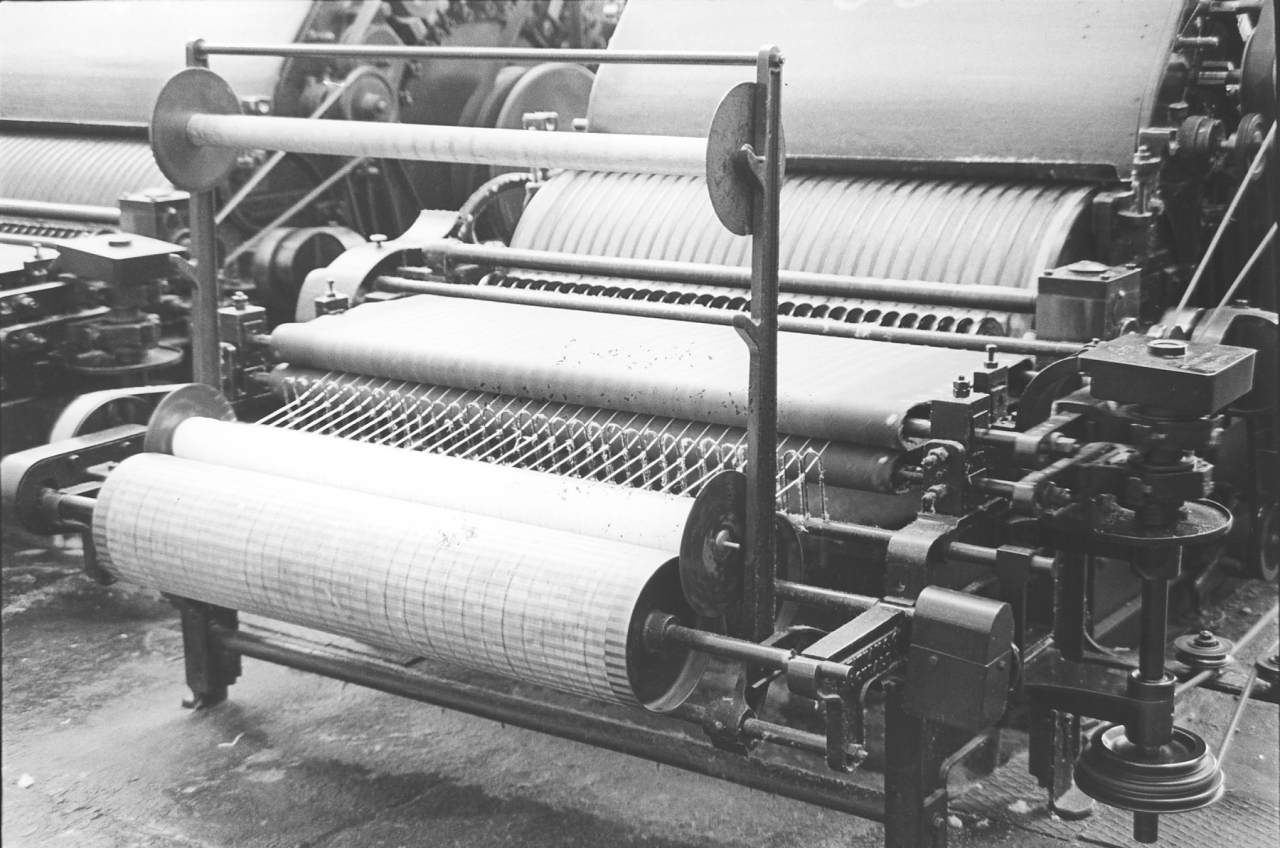
Condenser card.
R- Well, I work in an alley, a long alley with 23 carding machines. Me and another lady run these between us. She minds eleven and I mind twelve.
What end of the carding machine is this? Is this the back?
R- No, this is the front.
That's the front right.
R- Yes, these are the fronts. The back is where the laps are put on to come through the machine.
What sort of things are happening in this machine?
R- Well, the cotton's being thinned down and it comes through these rubbers at the front where they’re rubbed into ends and there’s thirty ends to a bobbin.
So really that’s the last process before it goes up to the spinning room. Am I right?
R- Yes these bobbins that we make go on a rack [conveyor] to the spinning room.
And is that the rack at the top there?
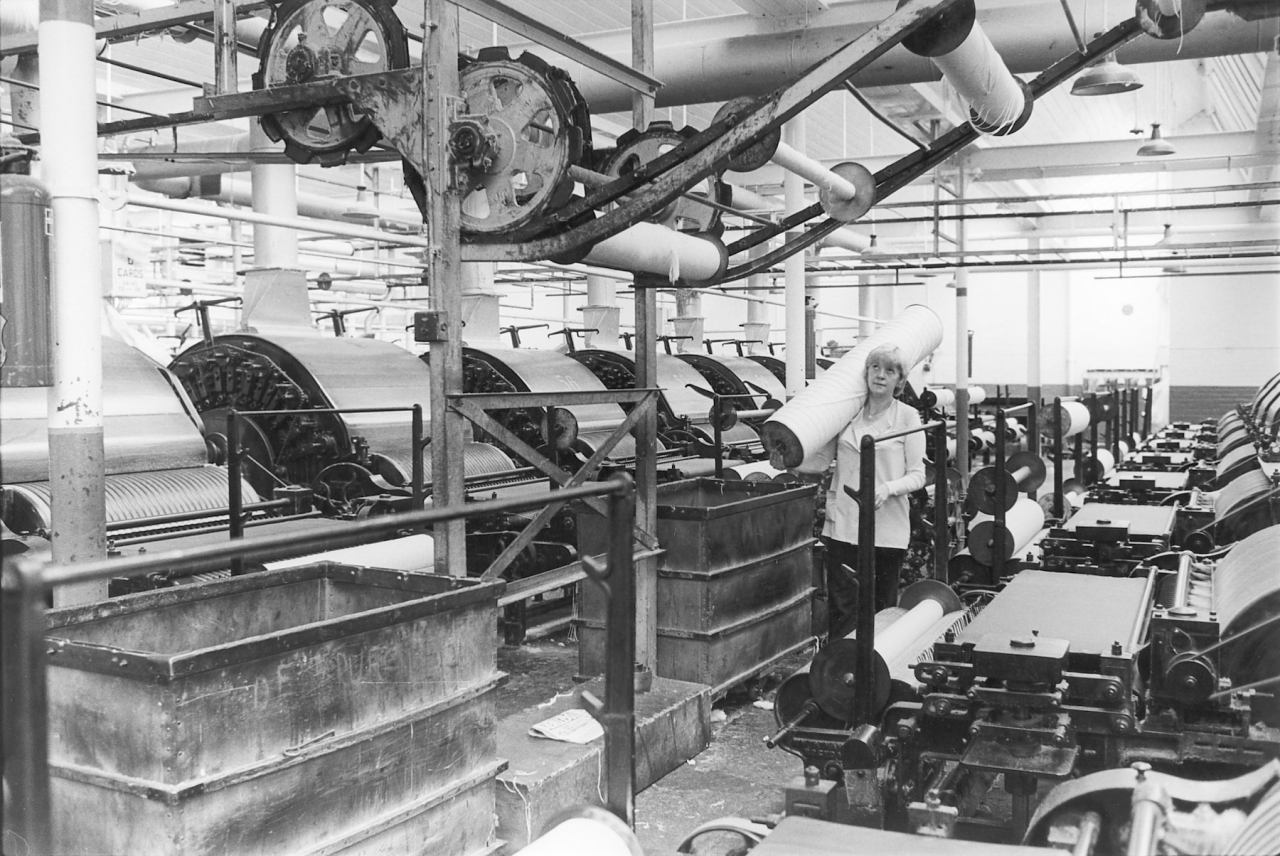
[35]
R- Yes, that’s the rack running over the top with the full bobbins on and the empty ones coming back. [I'm afraid Mary has got the pictures mixed up so I shall do my best to put it right]
So it's partially mechanised anyway.
R- Oh yes.
And these bobbins on the rack at the front of the machine are the empty bobbins waiting to be put on once these bottom ones are full?
R- That’s right.
Yes so you are well prepared that morning or whenever that was taken.
R – Yes. Oh we always have them on the cards ready to just drop in when we take the full ones out.
Do you always start the day at a certain stage in the process or did you start where you left on the previous night.
R - We just start where we've left off the previous night.
So it’s not a full bobbin or an empty one or anything?
R- No there can be some full and some nearly empty.
And how do you cope with having twelve at once? Presumably they are not all finishing at once.
(25 min)(550)
R- Well actually if they do all finish at once it's easier. Because you can get all your full ones out and your empty ones in and you’re straight for three quarters of an hour.
But presumably while you are getting them all straight there are some that are lying idle?
R- No.
You can do it all that quickly then?
R- Yes.
So how long …?
R- But you see, you can’t always have them all straight, because sometimes the ends break down on a bobbin when it's half full and you have to take it out then and find all those ends and straighten the bobbin up.
What happens if an end goes down inside or does that not happen?
R – Down?
Inside the drum.
R – Sometimes they drop down the dividers. Well we just pick them out again.
And what do you call the dividers?
R - These are the dividers, where this iron bar’s running across the front of the drum.
So Immediately the cotton comes out of the drum it can sometimes can go down there and that’s what you call the divider is it?
R- Yes.
Oh I see, right. So we’ve exhausted that one?
R- I think so yes.
Right. Number 34. Now where are we here? [29 actually]
R- These are the back of the cards that I work on. These are where the lap carriers put the laps on for us. There are two laps to each card.
You say they put them on for us, do you mean somebody carries them down to put them on for you?
R- Yes and they actually put them on, we don't. We don’t mess with them, we don’t deal with the laps at all.
Is that because they are heavy?
R- They are heavy for a woman, yes.
And is there somebody specific who does that?
R- The grinders put the laps on yes.
And where do these laps come from?
R- They’re laps off the Derby Doubler.
So that’s the process that happens before carding?
R- Before we get them yes.
Well I should call it not just carding should I. Condenser carding? Because there’s breaker cards as well isn’t there.
R- Yes, for the Doubler.
Does it matter, there’s the second one on, there’s a full one and one that’s nearly empty does that matter?
R- Yes because when these back ones are empty they pull the front one to the back and put the full one at the front.
For any particular reason?
R- Well it’s easier to do it that way because if you’ve a big lap at the back you’d have to lift the other one over it to get the front one on.
(600)
And this trolley, sort of half way down the alley. Are these….?
R- Those are the laps, where they stack the laps ready to come on the cards.
Ready to come on the cards? Oh I see. And in the big drums it’s been fluffed about?
R - Oh yes.
It doesn’t stay in those laps?
R – Oh no. It goes through rollers, wire rollers you know.
Draws the fibres out?
R – Yes.
What about the lighting in your shed.
R- Well there are old fashioned lights, just the ordinary bulbs with the green shades you know.
Green for any reason?
R – No.
And is that sufficient lighting?
R- Well it could be better. It is just sufficient but it could be a lot better.
And do you always have them on?
R – No, only Winter time when it’s dark mornings and afternoons.
Because you've got the lights above, the glass above you. What's this metal grill down the middle, do you know? No, it's not a grill, it seems to be a cover plate of some sort.
R – That’s where all the waste cotton goes from the side pipes.
How is it? Yes, well you could perhaps explain that on number 35 better can you? Number thirty five, it's still that way, isn’t it? [3910]

R- Yes. Like I said, there’s thirty ends to a bobbin, on the actual bobbin. But there’s also two more ends that goes down those side pipes.
At each side.
R - At each side of the card yes.
I think probably later an we can see those side pipes a bit more easily. And they're sucked off ...
R - Yes. And they go into a side end machine, what’s called the side end machine, that’s cleaned out every week.
Where is this side end machine?
R – That’s against the Derby Doubler.
So they're sucked off from there and carried down this piping underneath these metal plates that we've seen at 34?
R- Yes.
And they’re taken to…
R - A machine, the side end machine that's against the Derby Doubler.
Alongside it? .
(650)(30 min)
R- Yes.
Yes. I’ve not seen that or not been aware that. You’ll have to show me that afterwards. So on 35 we are now at the front of the machine? [use 3910]
R- Yes.
And and these rollers, I believe they are leather are they not?
R- Rubbers.
Rubber.
R- Rubbers, they are not called rollers they are called rubbers.
And is it made of rubber or of leather?
R- Leather.
Is it leather?
R- Yes it’s leather but they call them rubbers.
They call them rubbers. And I gather that these move sideways against each other.
R- Yes.
Do you know what that’s for, why it’s done?.
R- To make them come out fine.
But there is no twist being put in it is there?
R- There is no twist in the cards, no. That is put in by the mules.
Yes. And these oblong wires, they are guide wires are they?
R - Guide wires, yes, that’s what they are called yes.
And these ends, they can be broken very easily can they?
R- Oh yes.
So you have to keep your fingers well out.
R- Yes.
What happens if one down go down?
R- Well we piece them. We’d pick it up, get hold of it and just piece it up again, put it through the guide wire and on to the bobbin.
And you don’t have to actually twist the thing, you just put it through again.
R- Right.
And when that goes to the mule spinners, when that point comes on his mule what happens? Will that end go down?
R- Yes. And then he finds it on the bobbin and puts it back through.
So if you get chased at the end of the day you know you’ve sent a few bad bobbins up that day.
R – Yes.
On the front bobbin and the bobbin just from the cylinder there seems to be metal strips but they presumably aren’t.
R- That’s the doffer where the ends come through and go through the dividers.
So in fact that’s not steel bands. That’s a gap there.
R- No they are leather bands that you can see round that doffer.
(700)
Leather are they? And, and the one right at the very front, the one that the bobbin’s sat in?
R - They are wooden rollers.
Wooden rollers? And are those gaps then that I just thought were steel bands?
R- Those are just gaps yes.
Why are they not solid?
R- Because they help to shape each individual end while the bobbins running.
Yes, I am with you. They’ve two upright metal supports.
R- Yes.
Is that the bobbin rack?
R- Yes, we put full bobbins on there and drop the empty bobbin into the card.
So you haven’t actually got your empty ones ready on there have you.
R- No.
There is an old sacking at the bottom of the, what did you call this here?
R - Bobbin roller.
At the bottom of the bobbin roller there is what looks like old sacking. Am I right?
R- Yes. This is the card that's first through the door as you go into the card room. And that’s to stop the draught blowing under the card and bringing all the ends down.
So it’s only on the one that’s going to get the draught?
R- Yes.
Thirty six. You've got an empty bobbin on the rack there so that shows that more clearly. Can you see the side, what did you call it? The side sheet or…. Where the ends are sucked off. Can you see that on there or not? [use 3910 again]
R- Just there, just at the bottom of the doffer against this metal box at the end of the steel bar.
Oh I see. There are two steel bars are there not?
R- Yes, that’s it.
You can just see the first sign of the thread coming through can’t you.
R- This second steel bar, that’s the safety bar so that when you put your fingers into the dividers they don't get caught in the rubbers. You can’t put them far enough down to get caught in the rubbers.
And that’s the point at which they can break, but more normally they're breaking down at this front end, are they?
R- Yes, they break down at the front more, but as they're coming on to the bobbin.
(35 min) (750)
So it’s sucked off just against this metal box here.
R- Yes, and at the other side as well.
There seems to be some problems up there or is it? Just as they’re coming through these guide wires there seem to be a lot of bits of cotton or is it just the photograph?
R- No, it's bits of cotton, it sticks to these guide wires. We have to clean these on Fridays when we stop.
Once a week.
R- Yes.
Do you do anything else on a weekly basis?
R - We have to clean all the cards, we have to clean all the sides And every day we go down on our hands and knees and take, well we call fly, lot of fluff that gets underneath the front of the card. We get down on our hands and knees with a long brush and sweep all that out.
Is that called anything special?
R- It’s just call it 'taking the fly out' you know?
So cold knee caps!
R- Yes.
You’ve got an empty bobbin on the rack there, ready. Now I’ve seen a lot of bobbins with cotton waste on but that one hasn’t.
R- Well, I’ve piked that one off.
Pike it?
R- Pike, yes. We have a steel piker with a sharp and, and we pike all the cotton waste off the empty bobbins as they come from the spinners, the spinners send them back on the rack from upstairs.
And why do they have some on.
R- Well they can't run every little bit off. Because as we change the bobbin we just throw the ends over so they wouldn’t run off completely off the mule.
Very good. Picture 34. You look as if you're busy there.
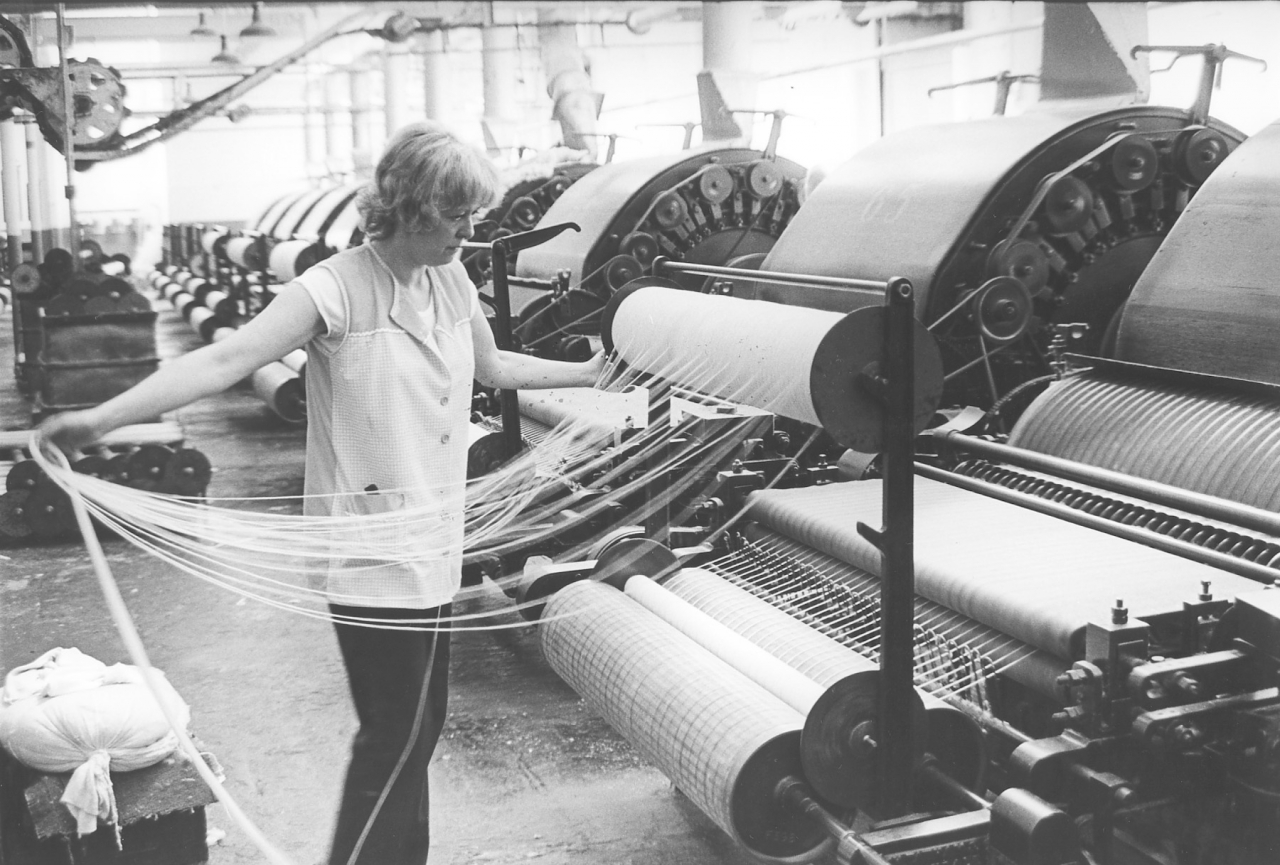
R- Yes. Well this is a bobbin that I’ve taken out which is not full.
When you say not full, what do you mean?
R- Well the bobbin isn't ready, wasn’t ready for taking out but I have to take it out because some of the ends had broken down, too many to piece up. And I’ve had to take that bobbin out and on this I’m finding the ends that had broken down and making it straight so that it can go on the rack and go upstairs to the spinners and they’re wound off.
So you’re rolling it off until you've got thirty ends?
R- Yes.
Do you have to count it, or can you tell at a glance?
R- Oh I can tell at a glance. Because each end's individual you know.
And presumably what you've pulled off will go into the same as the piked waste?
R- That’s it yes.
(40 min)
And go back through the blending process again. Very good. What’s this sack here?
R- Yes. Well, that’s what I use for kneeling on when I get down on the floor to take the fly out.
Ah I see, you’ve got it all worked out. On the top of these cards here there seems to be a big pipe or tube, well a pipe on every single one.
(800)
R- These? These are hooks…
No, the pipes.
R- The pipes yes. Well, that's for the dust extractors, you know to extract some of the dust that would actually be in the air. If these weren’t on it’d be a lot dirtier than what it is but for these.
And you did mention the hooks, what are those?
R - Those are for the grinders to use for when they lift the covers up, these wooden covers on the cards, they hook them on to there to keep them up so that they won*t have to actually hold them you know, their both hands are free to take the rollers out when they're doing the grinding.
Oh I see. Short sleeves there, so I think that was summer time was it?
R – Yes. I don’t think it was too bad that day yes.
Thirty five.

R- This is where I've just taken a bobbin out, a full bobbin and I’m carrying it down the alley to put on the rack. There is an empty one just coming back so I’ll take that off and put this full one in it’s place.
And would you be able to lift that empty one up with one hand?
R – Yes I can.
But you are wanting
R - I don't like… The lady that works with me she can’t do that you know but I've just got used to doing it I suppose, you know?
How long are these bobbins?
R - How long? About three foot.
Three foot?
R - Two and a half?
I would have thought they might have been longer actually but you certainly had to balance it, hold it mid-way hadn’t you? So that you can hold them with one hand. Let's measure one afterwards.
R- Yes. About half way. If I have it at arm’s length, just about half hanging over, oh me shoulder at the other side!
Are these heavy those full bobbins?
R- No they're not very heavy no. Quite light really. To look at, someone who didn’t know might think they were heavy but they’re not, they’re not heavy.
But the centre of the bobbin is wood is it not?
R- No. Some of them are but most are metal.
So you've got two metal ends and wood and some metal. And I would think that that’s almost the hardest part of the job isn’t it?
R- Yes.
The actual bobbin itself without the cotton.
R- Well they’re very light really. It’s only this metal, not solid, one or two of them are probably, but most of them are hollow inside.
What about these two trolleys?
R- These two trucks are what we put the empty bobbins on so that we can pike the cotton.
(850)
Oh I see, there are grooves aren’t there so you can hold the maximum of three by the looks of it.
R- Yes and some more on top if we think it’s necessary you know.
So that holds all the cotton waste to go back to the blending process?
R - And these are emptied.
By yourself?
R- No, one of the men out of the devil hole comes and takes these and empties them in the devil hole.
Are you responsible for both sides of the alley or just one side?
R- No, both sides. Just twelve cards. They have five on one side and seven on the other and then the lady that works with me has six on one side and five on the other.
So have you got the front of one set against the front of the others, or do you have to go round?
R - No, they are facing one another.
(45 min)
Yes you’ve got two fronts facing you in your alley.
R - Which we sweep this alley every day as well after we've taken the fly out we brush the cards down and all these wooden covers, and then we sweep the alley up.
Very good. Now picture 36. There you are at it.
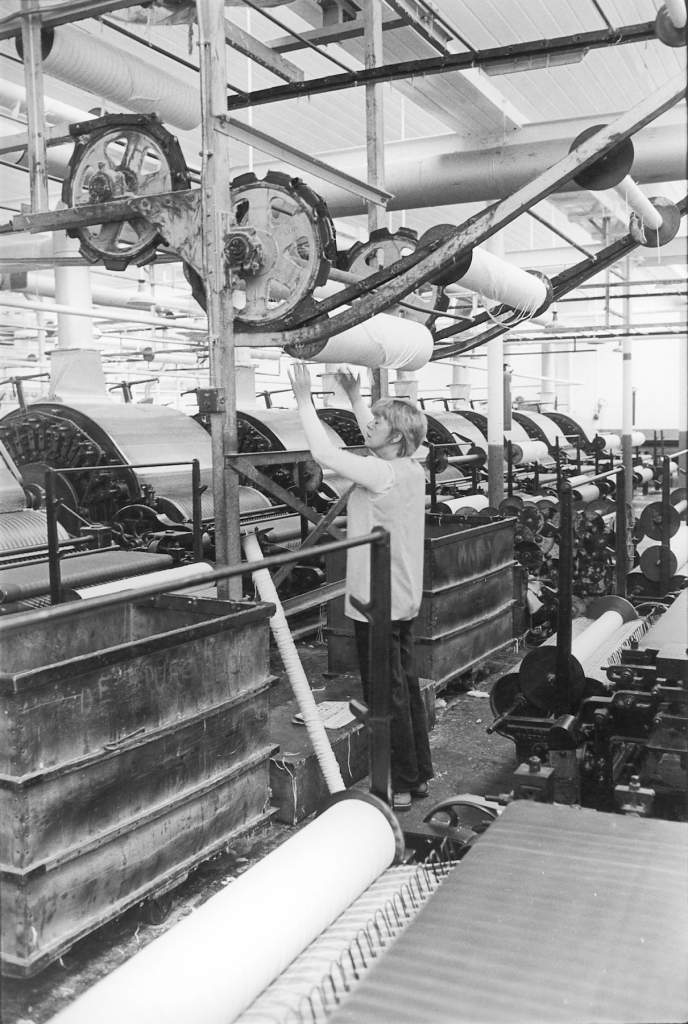
R- Yes. This where I’ve taken this bobbin, this empty bobbin off the rack and placed it at the side, well, I’ve put the full one back on.
They go into slots do they?
R- Yes. Into grooves on the rack.
I had to lift one out upstairs in the mule room and I didn't make a very splendid job of it.
R- Well it’s like anything else. When you get used to it it’s easy.
And of course they were thinking it was going to be peanuts for me because I am tall but it’s not just that is it, it's the knack of doing it.
R- Oh yes, once you’ve got the knack it’s easy.
What happens if the bobbin rack’s full?
R – Well, it’s not very often it is but if it is and the mule’s not running we usually stop for a while until they get done with them.
So you don’t hang on and make a store of them on the floor?
R – Not normally no. I have done these last few weeks because we haven’t been working at Friday in the card room with us being made redundant. But a couple of mules have still been running at Friday even though we’ve been stopped so we’ve had to stack a few bobbins up so that they wouldn’t run short you know, before we started work again at Monday.
Right, has that exhausted that?
R- Yes, I think so.
(900)
There is a very large overhead pipe on the other side of the bobbin rack, what’s a that?
R- Oh I don't know what that’s for. That's one of the dust pipes.
Oh, this from the top of the carding machine?
R- Yes.
And that’s carrying it to where?
R- They have big dust bags in the scutching hole. I think they go in there, I’m not sure you know but I think so.
Right, 36. [3908]
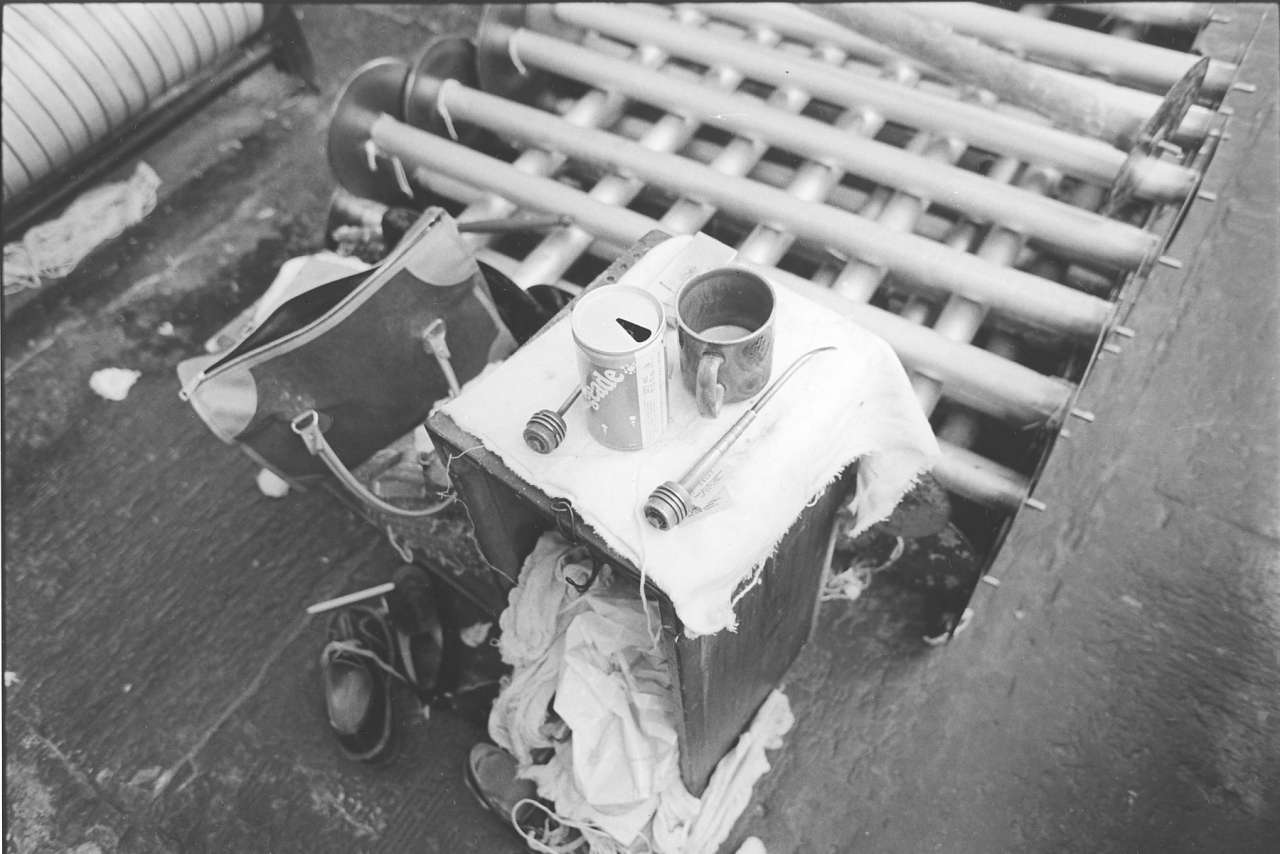
R - Now these bobbins in the alley that you can see on the floor have all been taken off the rack and piked then we store those in the alley, the empty ones so that we can just pick them up and put them on the cards, ready for changing over.
SCG/24 June 2003
6,567 words.
LANCASHIRE TEXTILE PROJECT
TAPE 80/SHF/02
THIS TAPE HAS BEEN RECORDED ON APRIL 11TH 1980 IN THE WRAPPER ROOM AT SPRING VALE MILL, CHARLES LANE, HASLINGDEN. THE INFORMANT IS GLENYS KIRBY, CONDENSER MINDER. THE INTERVIEWER IS MARY HUNTER.
[3901]
On the stand that you’ve got at the front of the card there seems to be space for three bobbins, one that’s in, the empty one and you've got one missing, one empty there. Why don’t you put a second empty one there?
R- Well you can do, sometimes at odd times I do but mostly I don’t bother you know. I leave an empty space on the top stand so that I can look up the alley and if there’s any ends broke I can see them without having to actually keep walking up and down. But when I’m ready for taking the full bobbin out I have to move it on to the lower stand so that when I take the bobbin out I can just put it on the top stand and drop the empty one in from the second stand, the bottom stand.
And I presume if you put the full bobbin on the top it’s easier lifting on to your shoulder then?
R – Yes. But you couldn’t put the full bobbin on the first stand because your empty one sort of wouldn’t drop in properly you know.
(50)
And do you have to stop the machine when you…
R – No. The machines are set on at half past seven in the morning, all of them and they don’t stop again unless they break down or something till we knock off for dinner time at twelve o'clock. And then they’re set on again at one o’clock and they don’t stop again till we're ready for going home at half past four.
And do you set then on, or do the grinders set them on?
R- The grinders set them on yes.
And when you say grinders that includes presumably the carding overlooker, I mean do you call the carding overlooker the grinder?
R – No, we call him the carder, our boss you know, he's called the carder and then there’s another man, the under-carder, they repair the machines if they break down and they are in charge of that room. If there is any problems you go and see him.
So they are like a tackler in a weaving shed are they?
R- Yes. Like they are our boss you know, the one that we go to first with any problems, who wants to go earlier if we want some time off or something.
(100)
Right, that’s that isn’t it. I think?
R- Yes.
Right. Picture 39.02.
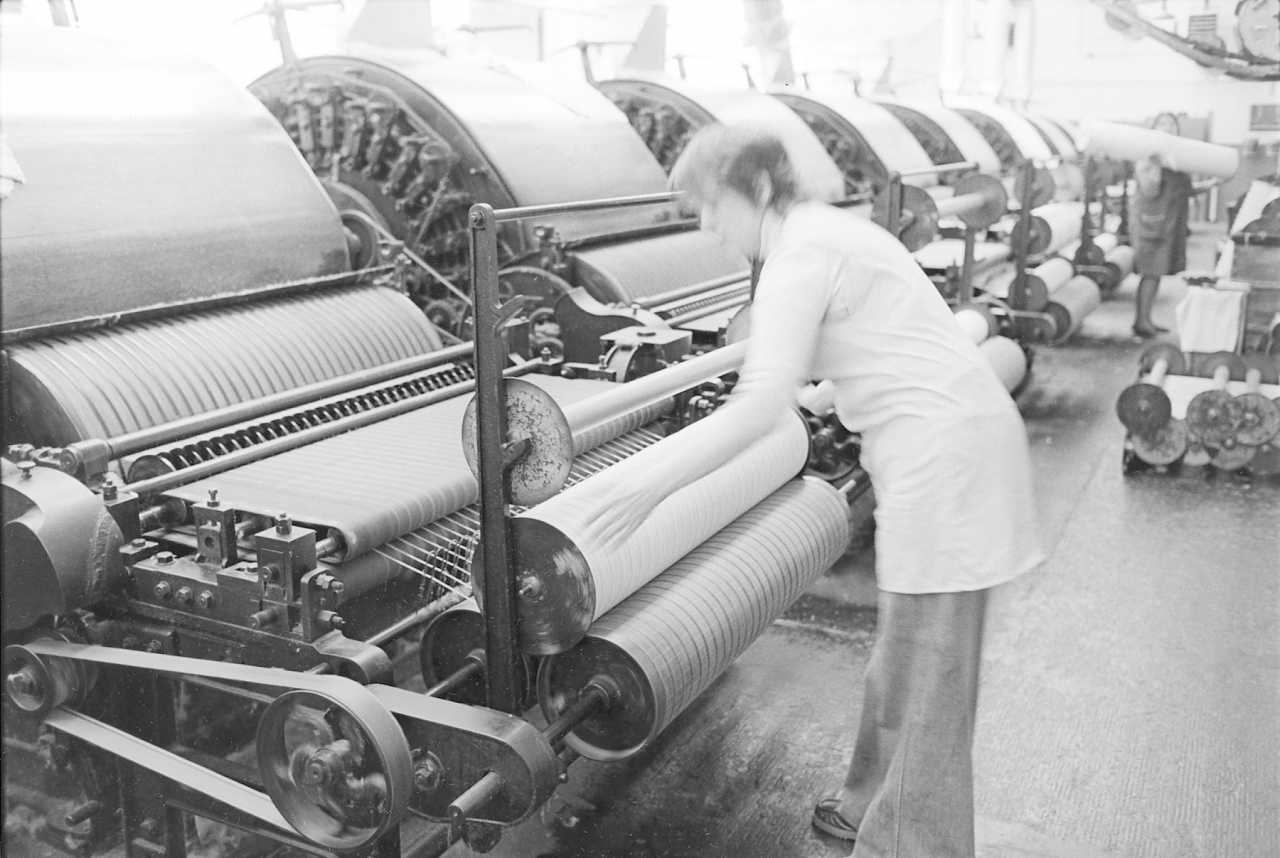
R- This one’s where I am just going to take a full bobbin. I've moved the empty bobbin out of the lower stand and I’m just going to take the full one out and put it on the upper stand.
How do you tell when a bobbin's full?
R- Well, when the stuff reaches these things on the end of the bobbins, they're called flanges. And when the stuff reaches the top of those flanges they’re full you know and we take them out.
What happens if one goes over?
R – Well, that’s a mess. Because we have to run it all back off till it’s level you know. Because if it runs over the top it won’t run on the mules, the two side ends will keep breaking down all the time.
And have you ever done that?
R – Once or twice. Not usually you know because we're watching them all the time but if we are busy… I’ve been busy an odd time doing something else and I’ve messed it up. No, it’s not done very often.
So you keep quiet when that happens.
R – Yes, I just run it off.
Is that it? I think it is. Picture 39.03.
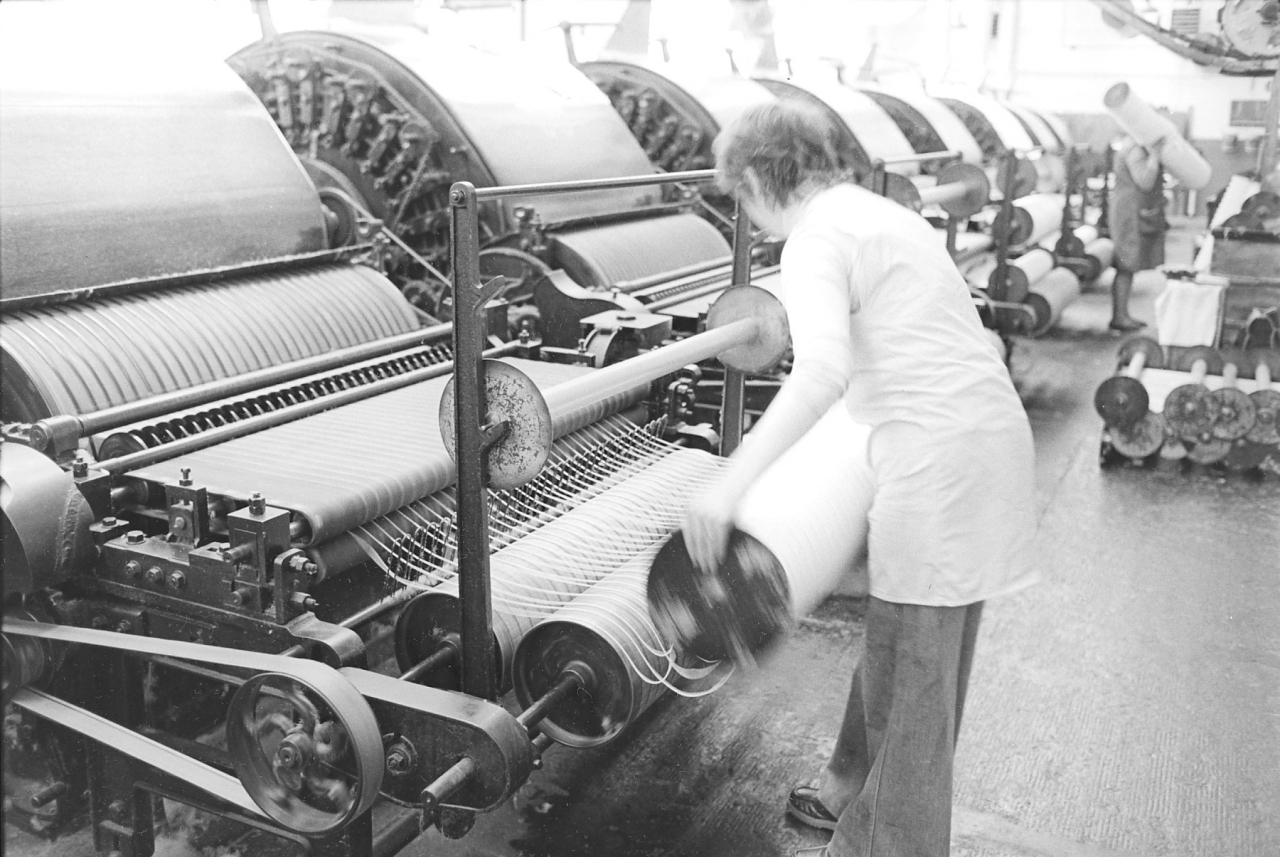
R - And this one shows just where I’m taking the bobbin out to put it on the top stand again and the bottom one is ready to drop in
So you don’t actually break the ends?
(5 min)(150)
R- Not at that stage. Not till I've put the bobbin on to the top stand and drop the empty one in, then I break them and throw the ends over onto the empty bobbin so as it starts running again.
And can you hold on to it fairly well just by holding the flanges like that?
R - Oh yes. Just slip it onto the top stand and then it's .. I don't touch that again till I take it off to put on the racks.
So it looks as if you’ve run a little bit over the .. what did you call that one? The bobbin…
R - The big wooden rollers, yes.
The wooden rollers at the front, you run it over there a bit, you run it over there?
R – Yes. Well, if you took them straight up you see they'd all break. Because it's so fine you’ve got to allow a little so that you can put them up on this top stand and they don’t break.
Right. So there you are then. In 39.04 ...
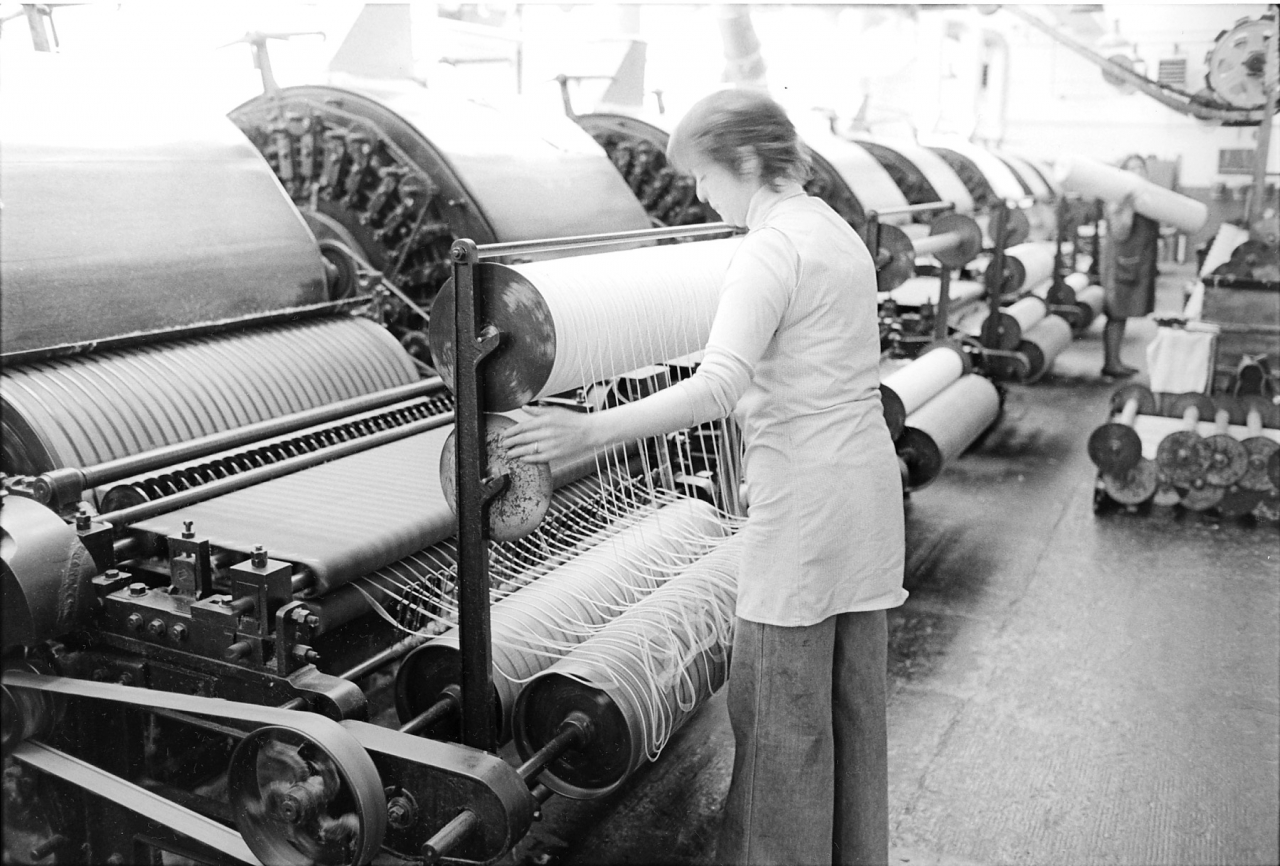
R - This is where I've already put the bobbin on the top stand and I’m ready for dropping the empty one in, and you can see the ends are all still…
Coming through.
(200)
R- Coming through, still unbroken. And that’s me friend that works in the same alley as me, Lilly, in the background ready for putting a bobbin up on the rack.
Holding the full one. Yes. What have you got between the empty bobbins on that? You’ve got them all stacked up. It looks as if you've got something in between.
R- No I haven’t. You see you can't, you can't stack them all the same way. You stack eight one way and then eight lengthways and then another eight crossways.
So it sounds then as if the width of the flange times eight is the length of a bobbin.
R – Yes.
Oh I see right. So let’s see what you're doing in 39.05.
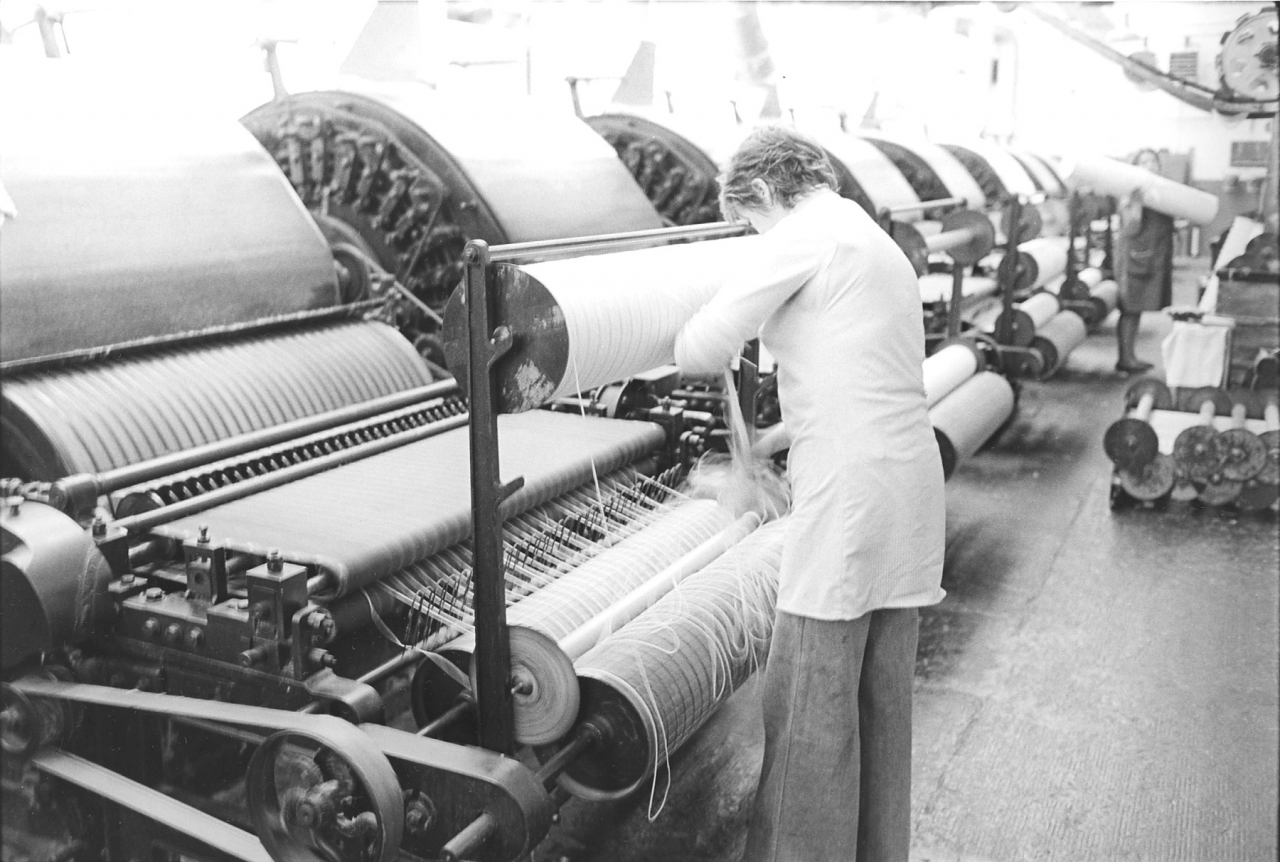
R - Now this is where I've put the bobbin on the top stand and dropped the empty one in and I'm breaking the ends off ready to throw over the empty bobbin and start up again.
The loops of ends that you’ve got over this end bobbin .. do they catch up with themselves?
R - Oh yes. If any do slip down a bit you just pull them, pull them through the guide wires and they're all right.
It looks as if you have in fact lost one.
R – Yes I have, it’s the end one.
Right at this end.
R- Yes, but that’s nothing.
And what about in the middle, have you lost one in the middle there as well?
R - No that’s running down a bit, but they catch up.
(250)
Oh I see. The tension's loose on that one. Yes I see, it looks as if Lilly’s still waiting to put a bobbin on.
R - Still waiting.
Picture 39.06. You've broken the ends.
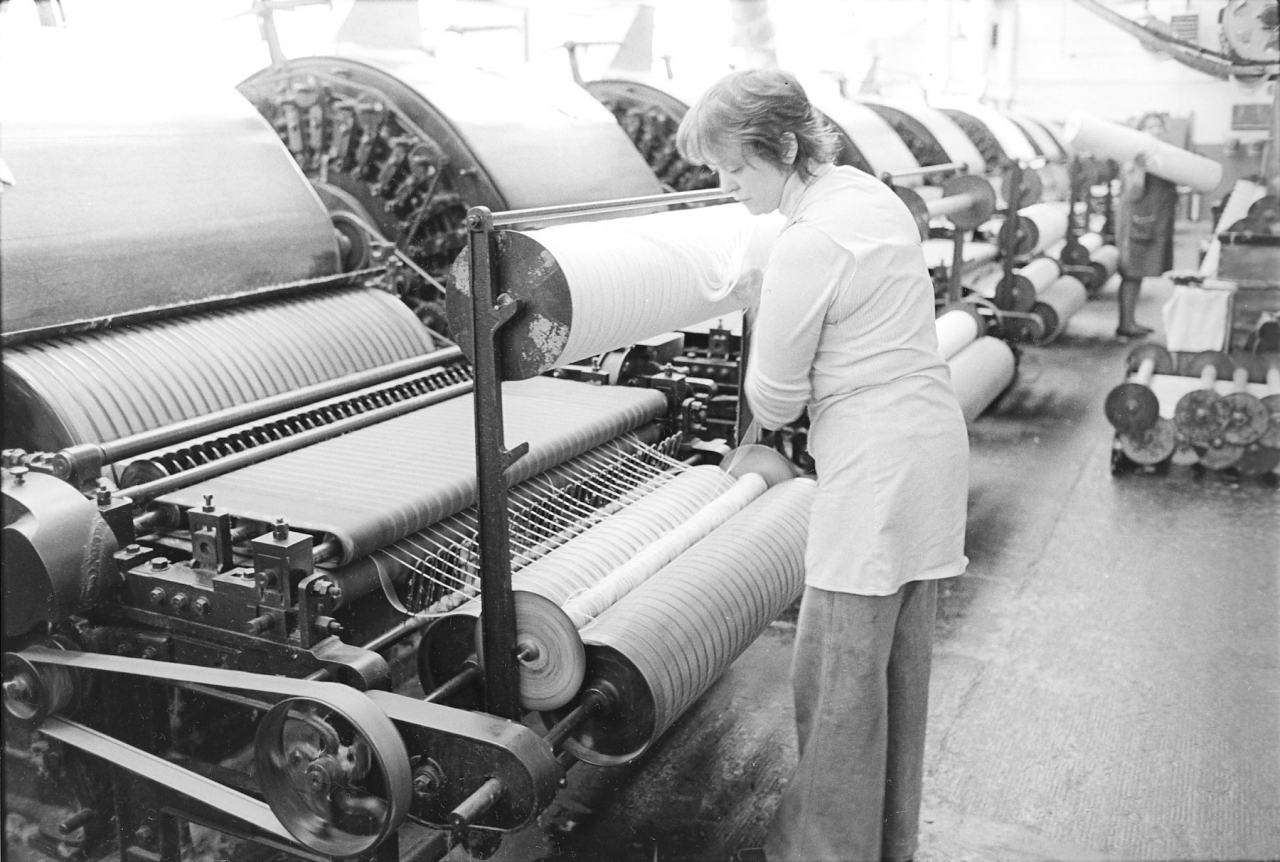
R- Yes and I’ve thrown them over onto the empty bobbin, and now that’s ready for filling up again.
So when you throw it over does that catch up then with all these other loose ones hanging over the end? You gather them up and throw them in?
R- Yes.
And then what do you do with the top one, the top bobbin?
R- The full bobbin? I roll all the ends together in between me hands and stick them into one of those spaces in the bobbin so that when they go upstairs the spinner just pulls them out and they’ll all come out together ready to go straight into the mule.
(10 min)
And presumably if you didn’t do that very well he’s got to rub some off?
R- Yes, it’d be a mess you know. You've got to make sure they’re just right.
And you can see there that you’ve, on this end thread, you’ve picked it up and guided it through and it’s now pulling itself up.
R – Yes. It’s, I made a bit of a mess of that one actually when I were doing it you know. Usually you can just throw them straight over and they are all straight you know.
Well, it’s just as well to show the world that it doesn't always happen perfectly.
R- Oh no.
Picture 39.07.
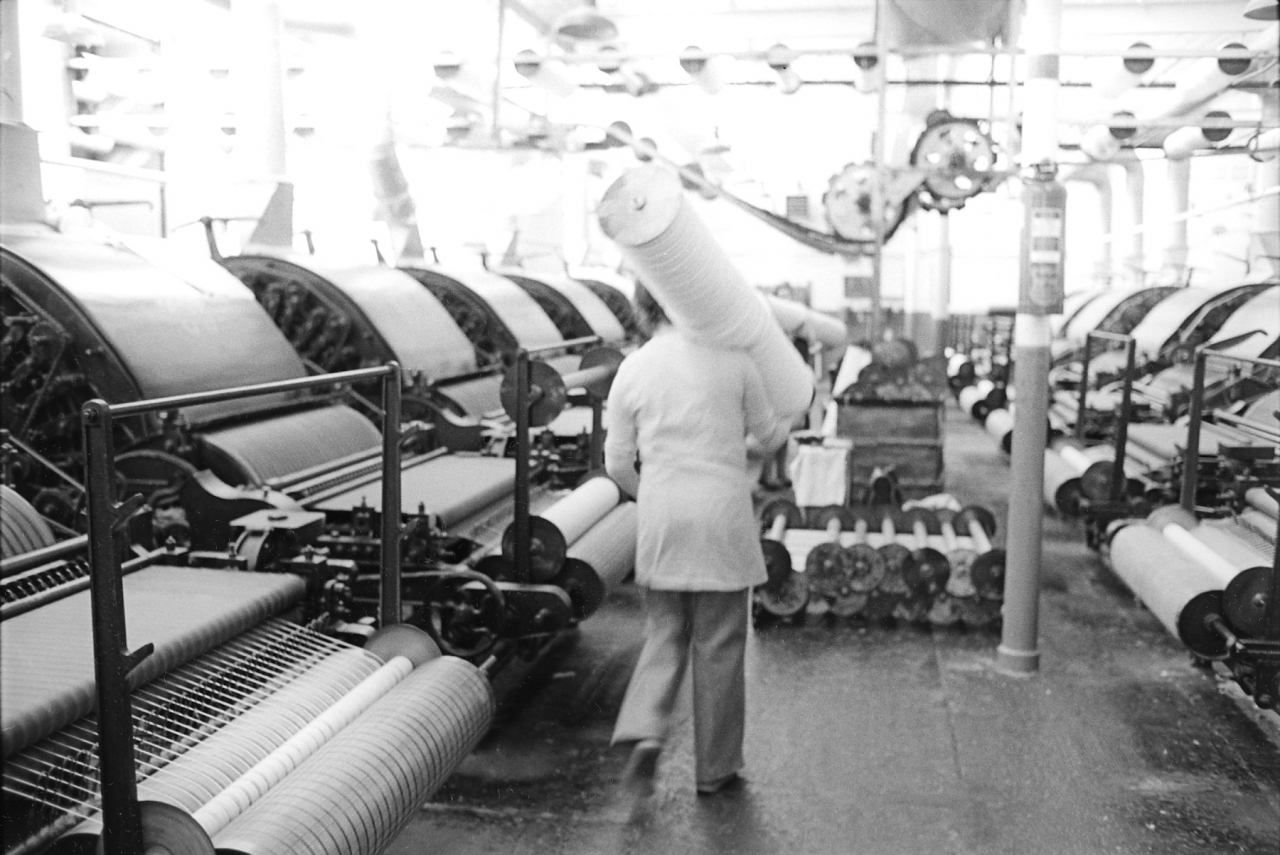
R- Well, you can see all the ends have caught up, the bobbin’s all straight and I’ve taken the full one off the top stand and I’m carrying it down to put it on the rack.
(300)
Now that’s it. We’ll have a little bit of a queue because Lilly’s still waiting.
R- Yes she is. Well, if there isn’t room I just stand the bobbin up on its end against the rack ready to be put on.
So all is well by the look of things. In fact looking up the alley there’s quite a few that are just…
R- I’ve changed quite a few, yes.
Picture 39.08. Now there is a picture for you.

R- Well, this is what I call me box where I keep me pots and these two steel things and me pikers what I use for piking cotton off me empty bobbins. A can off pop, me bag, me shoes.
And lots of rags by the looks of it.
R- Well this is what we use for cleaning the machines, wiping the machines over, on a Friday.
And you collect that up from wherever you can? Or do you get supplied.
R- No, we get supplied. You can see on here where, how I stack the bobbins, lengthways and across.
And there is obviously just in this left hand corner the end .. is it called the bobbin?
R- The wooden rollers yes.
The wooden rollers and there is some waste on the bottom isn’t there.
R- Yes, that’s where some ends have been broken down, the waste all drops on to the floor. Well we pick that up.
What are these pikers made from?
R- Well, those two on my box are made from spindles that they use, the spinners use for making the cops for the weavers.
And have you had to get those yourself?
R – No, we get those [given].
And it looks as if just the top of the pirn [spindle actually] is just bent over.
R- It’s all been thinned out yes and it’s bent over and where it comes over there, it’s been sharpened, has a sharp point on so that [it hooks into the waste and pulls it off the bobbin]
{I’ve omitted some dialogue here because they are at cross purposes]
So that’s proof that it was a summer’s day, drinking your Coke. I think that’s it. Picture 39.09.
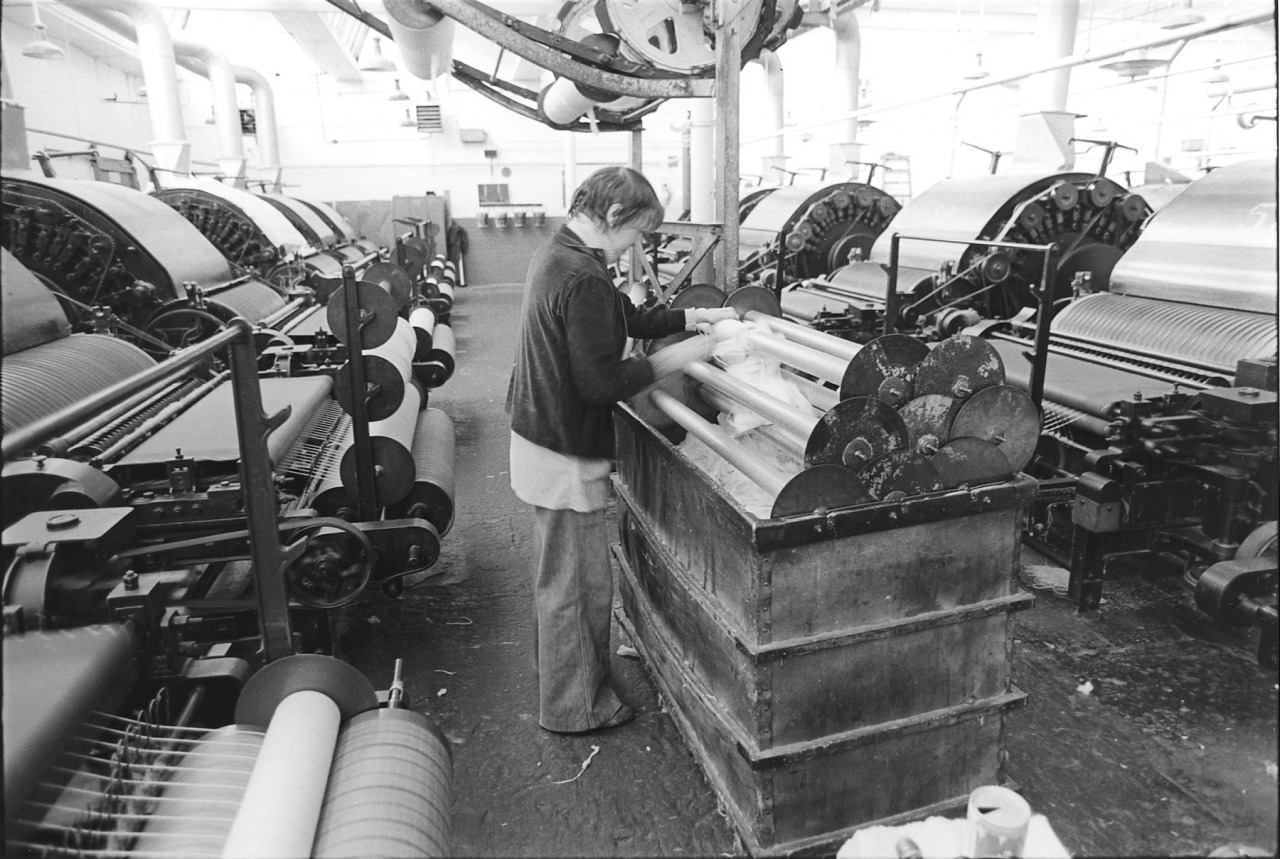
R- This is where I’m stood against me box with the empty bobbins that have been taken off the rack and where I’m piking, you can see I’m piking the waste off the bobbins.
Yes you’ve got a bale (?) stuck on there haven't you?
R- Yes. You see you have three grooves, three at the bottom. Well, you can start others on top of these till you get eight or nine on.
And you can pike all eight at once then can you?
R – Oh yes.
You can still get up them?
R – I usually do them as I put them on the box you know so that the ones underneath are already done before I put any more on top.
It's very much a team business isn’t it. I mean if the people from the devil room didn’t come and collect that waste in that trolley then that would get full and you couldn't pike any more ...
R - Yes.
And if the grinders didn’t come and put your laps on the back the card would be waiting, stopped. [Glenys doesn't mention it but occasionally one of the ladies would take a full lap off the doubler if she was held up.
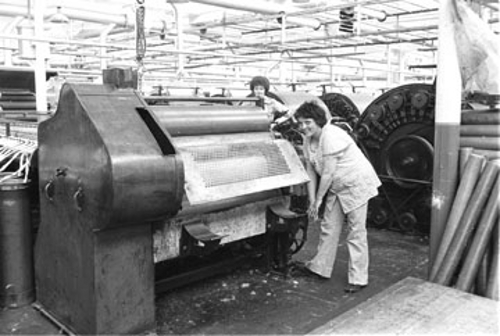
(15 min)(400)
R- Stopped, it would yes.
And if the mule spinners didn’t take the bobbins off the rack at the top, then you wouldn’t have any space to put the full bobbins back up would you?
R- No.
So everybody relies on ...
R - Everybody relies on someone else you know.
And I suppose if that someone doesn’t get on well with you, you could scupper the boat for them by not sort of cooperating with everybody.
R - Oh you could yes. See like me and Lilly that I work with, we have to work together you know. Because if we want a break I watch her machines as well as me own while she goes out and she watches mine while I go out. Otherwise we couldn't get a break you know.
Is twelve the normal number to be looking after?
R- Well it just depends. Over the other side of the card room they look after fifteen over there, which I think it’s a lot really you know when you have all your own piking to do as well. If you'd not got to pike the bobbins that wouldn't be too bad, fifteen really you know. But when you’ve all your own piking and cleaning and the tidying up to do as well it’s quite a lot is that really. I wouldn’t call it an easy job, I think it is hard work really you know.
So it’s usual for women to be doing it?
R- Oh yes it's a woman’s job on these single cards. Some places they have cards with double bobbins on, two bobbins, or…
Oh I see.
R- I think there are some with three bobbins on. Well, men usually run them you know because they look after the backs as well at some places, not here anyway.
(450)
Picture 39.10.

R- This one’s where I’m brushing the fluff off the side of the cards, making them clean you know, brushing the wooden covers as well.
What are you brushing it with?
R- Hand brush. It’s Friday.
And presumably you do that cleaning just when you have a spare minute or two.
R- Yes. Usually though I start mine, brush them all down, do them all together after dinner as soon as I get back at one o’clock. Take the fly out from underneath the cards and then brush them all down, covers and sides.
That’s all supposing that before dinner everything was ...
R- Was all right .. You know I try and leave meself straight so that when I do come back at one o'clock I can just start brushing down you know.
So I think you said it was an hour that a bobbin fills up if you have no problem?
R- About three quarters.
Three quarters of an hour. So if you start at half past seven, you take, what do you call it when you take one off? Is there a special word for it?
R- No. You mean when they're full, when you take them out when they're full? No.
So at quarter past eight, nine o’clock .. or when you have a break in between, don't you sometime?
R - Yes but we're… They carry on, they don't stop. Quarter past eleven.
Quarter past eleven . So that’s right before dinner eh? You’ve just changed over again.
R – Yes.
Ready for a clean start after lunch yes. That works doesn't it? Yes.
R- Pike an awful lot of empties off as well you know, just seems to be…
In between one?
R- Yes.
I was just wondering on that one whether you can see any more clearly the one that’s sucked off but you can't really can you.
(500)(20 min)
R- No, you can just see the pipe there at the side.
Can just see the what?
R- The pipe, there.
Ah, the pipe. Oh yes you can. Do you have to give any special treatment to these leather rubbers?
R- Yes, we put oil on then twice a week. The grinders oil them, we run them all bare so there’s no cotton coming through at all, and they grease, call it greasing those rubbers.
So that they don’t dry up.
R- So that they stay supple, yes.
Do you know what sort of oil it is?
R- Castor oil I think.
But you don’t have to do that.
R- No we don’t do that. That’s the grinders do that. We run them all off ready and they come along and grease them.
I notice on the cylinder’s lids there are numbers?
R- Yes.
Are those used now?
R - Not for anything special really you know. Like if some of them’s running bad or there's something wrong with it I’ll go along to the carder or the under carder and say number 69 is broke or something like that, you know.
Yes. Picture 39.12.
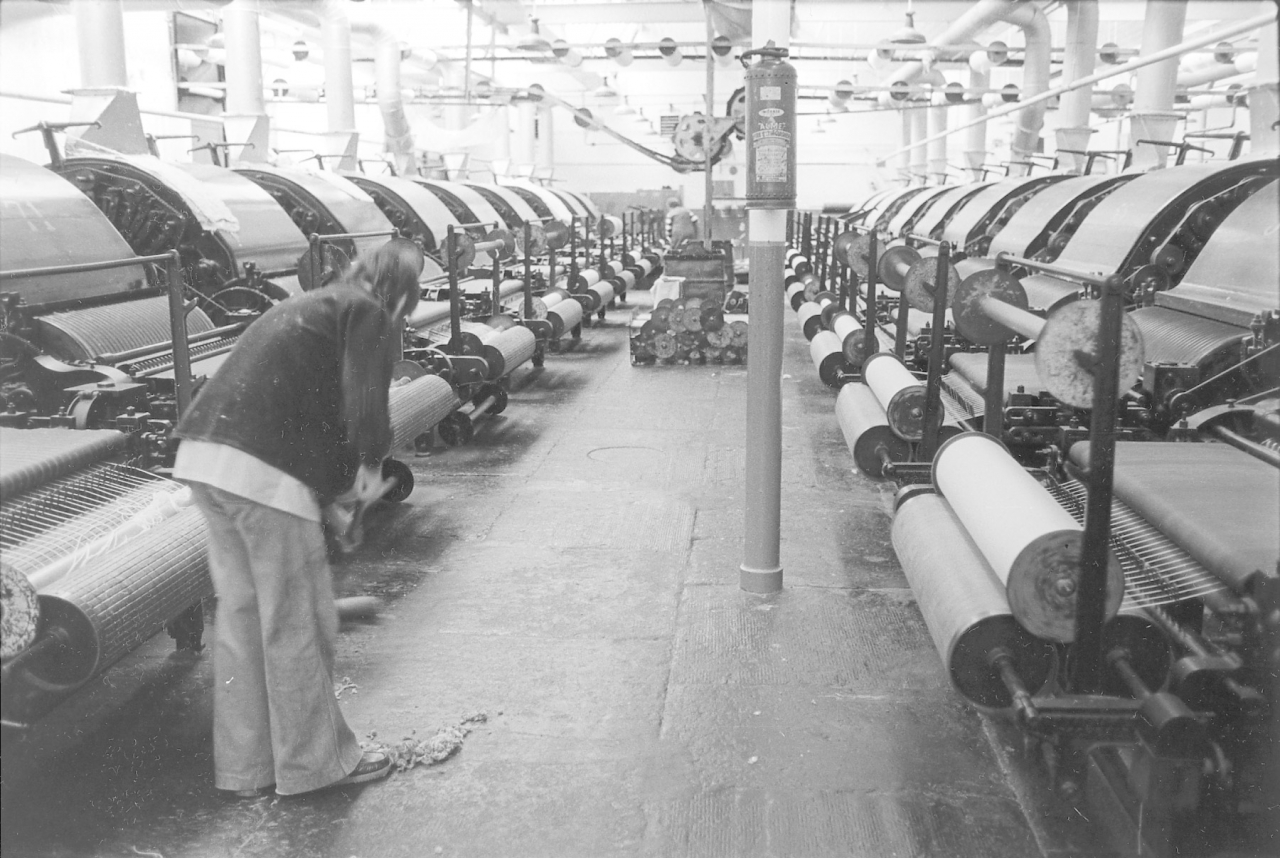
R - This one's where I've finished brushing the cards down and I'm sweeping
Up, sweeping all the fluff out of the alley, so that it's also straight and tidy.
Do you damp it down before you start sweeping?
R – No.
Does it not fly up in the air again?
R – No, it’s not too bad, no.
(550)
You've just started on your bobbin on there to your left, haven’t you?
R – Yes. I’ve just changed it and put it on the rack and started sweeping up. I must have been quick too, it’s only just started on there.
Oh I see, you mean you mast have done a sprint to the bottom
R - Just picked the brush up and started.
Very good. It shows a keen drive.
R - Oh yes.
That’s a fire extinguisher, is it?
R - On that pole? Yes, fire extinguisher.
What about fire in the carding room?
R - Well I've never known there to be a fire. Now the devil hole ...
Ah well.
R – That’s where most of the fires are you know. I've never known there to be one in the card room at all.
Picture 39.13.
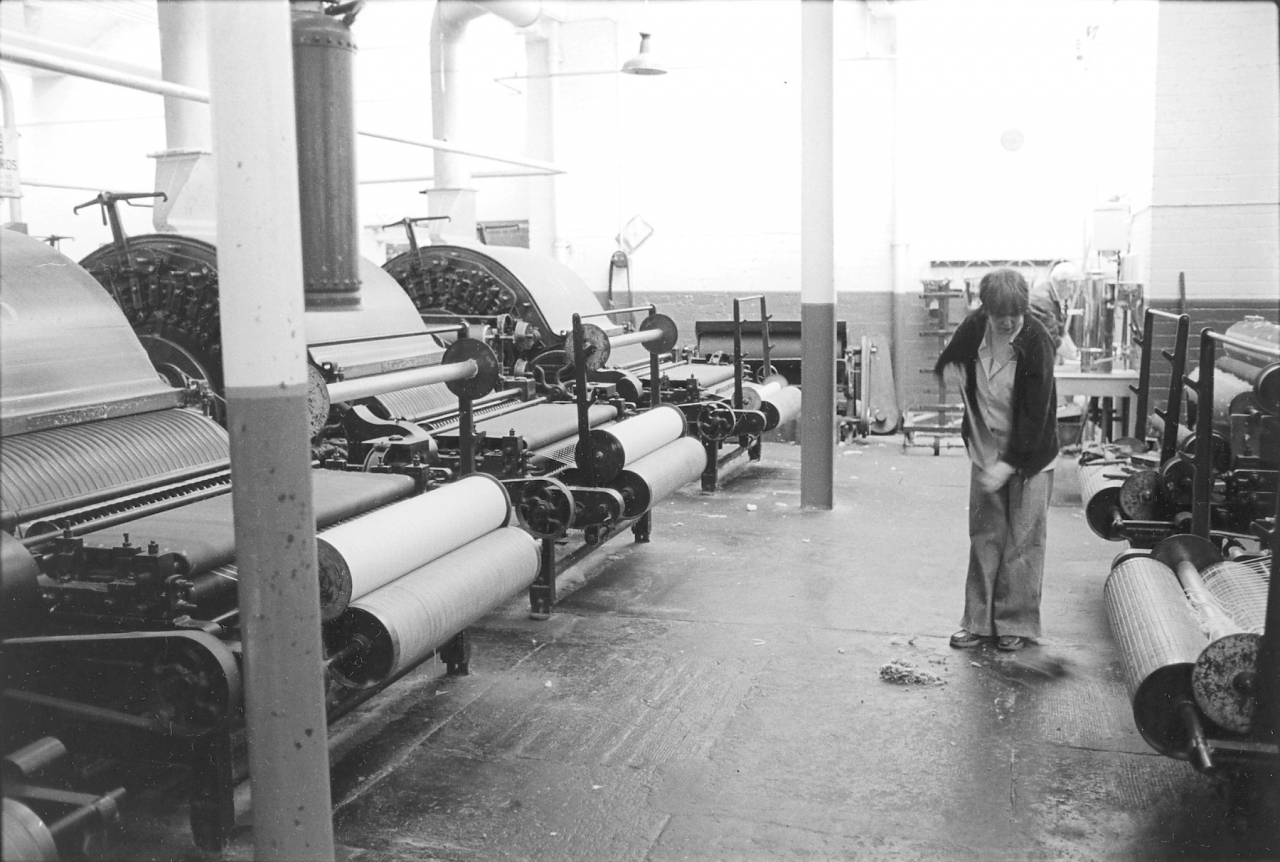
R- Well on this one I’m still sweeping up, and I think that card's stopped you know?
Do you?
R - It must be.
Yes I think probably it must have done because it…
R- This one next to it, the end one, they're grinding that, that's one that they’re grinding so that’s stopped.
What’s this very thin pipe, sort of a foot or two up from the cylinders .. ?
R – That’s one of the steam pipes.
One of the heating pipes.
R - One of the heating pipes, yes.
And that’s the other end of the alley that we haven’t seen in fact. Top end.
R - It is yes.
What's on the racks? Well, not racks, what's on the wall at the back?
R - These, these at the back, they’re the fire buckets with the water...
Ah, with sand in?
R – Water. And that machine there next to them, across from them, is the grinding machine where they grind, where they clean the rollers, next to the cards.
(600)(25 min)
How often is the grinding done?
R- Every day, Monday to Thursday, they usually grind two a day.
And so how often does each carding machine get done?
R- Well on an average I should say once a month.
What's that right in the middle of the wall?
R – That’s a red spot to indicate where the fire buckets are.
Oh I see yes.
R- And this here's the hot water geyser. Because just below that there's a sink where we can wash our pots and pans.
And make a quick drink?
R - Not there no, on this one, the hot water geyser here at the side you can yes.
So there in nothing to stop you having a drink during the day out of break time as long as the machines are working?
R- Oh no.
What sort of restrictions are there on here as far as you know, taking a break or going to the toilet or that sort of thing?
R - Well we are supposed to have ten minutes break at morning and ten at the afternoon, but sometimes we have a bit more because like with us watching on for each other we have an agreement you know that we can have a few minutes longer. And if we want to go to the toilet we can just go, I just tell her I’m going to the toilet and she watches on for me while I come back.
And that’s where you have your sneaky cigarette as well is it because you can’t smoke at your work.
R- Yes.
Because that would be a real fire hazard, wouldn't it?
R- Oh it would yes.
So there is a fairly free, relaxed attitude towards that sort of thing is there? I mean there isn’t any counting.. and the looker chasing you saying “Where are you?”
(650)
R- Oh no. That's one of the good things about working here you know. You can’t say they are really strict you know, not like they used to be in the olden days I believe.
Oh yes, you believe right. And picture 39.14 [in the strip/grind pictures in the Spring Vale folio] is where I think we stopped.
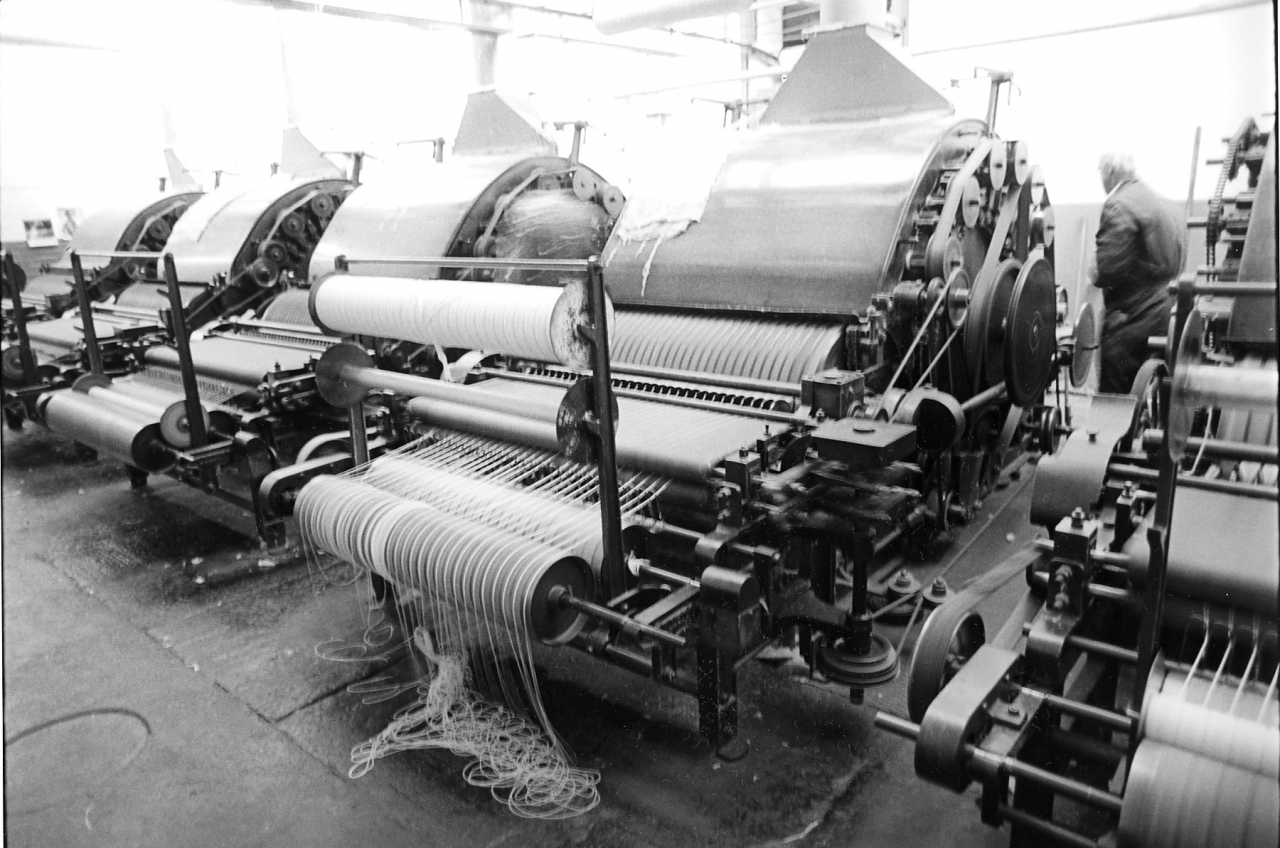
R- Yes. Now this [39.15] is where the grinder is getting ready to grind the card. They’ve taken the bobbin out that was in it and they're running it bare now, running all the ends off, ready to start running it bare yes.
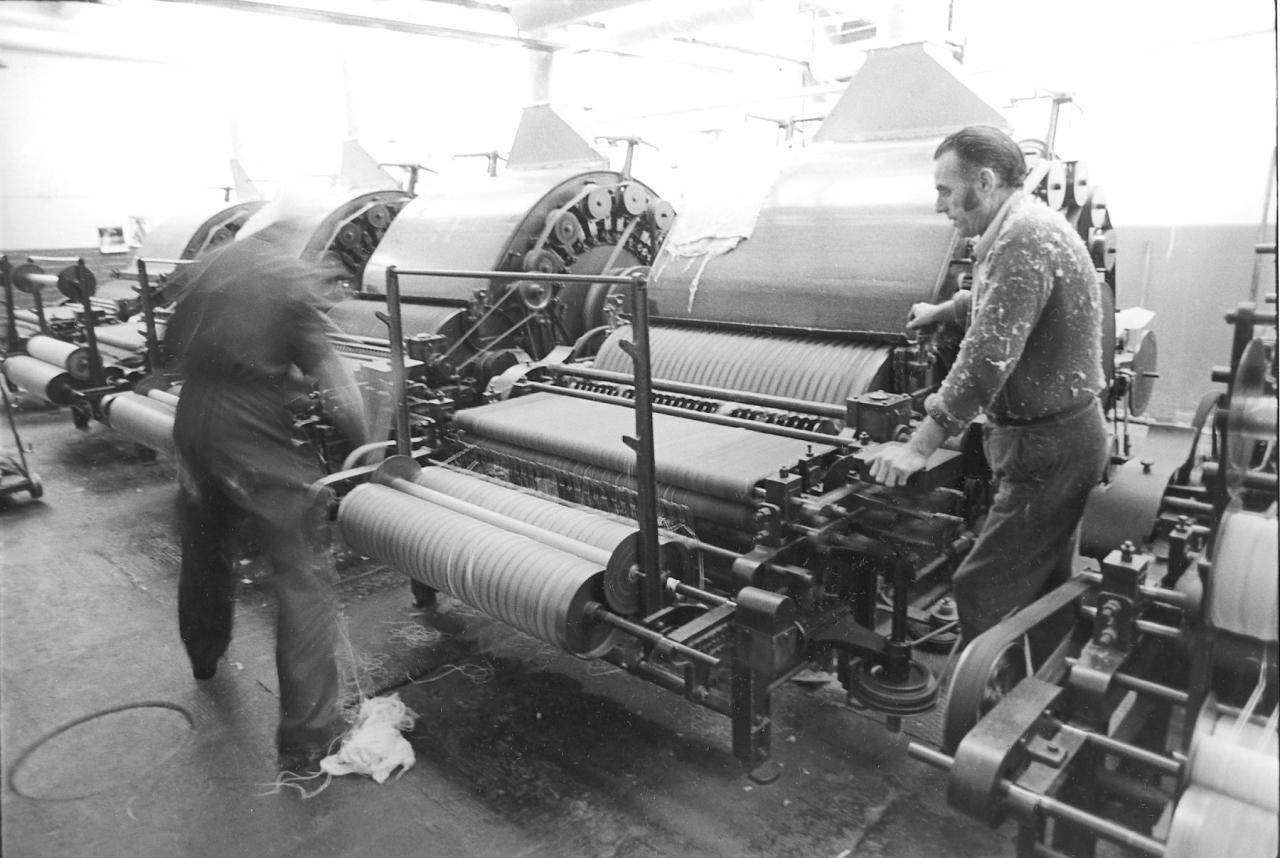
Running it bare, having it empty, getting all the cotton from inside the machine.
R- Yes, and the fronts, and they don’t take the laps off at the back, they just cover them over. They leave them on and just cover them over.
But they must break them, presumably.
R- Yes they are broken. And they’re just getting ready there to start grinding.
One thing that we haven't talked about because perhaps it hasn't been very clear on some of the photographs, but perhaps going back to say 34 will be the best one ... How quickly do those laps move into the carding machine?
R – Very very slow. I think they only change them… If they're very low at the back at the morning they might change them twice in a day. If they’re pretty full they might just change then once. They only move in very slowly.
So presumably the bobbin itself is rotated is it?
R- The lap.
Sorry, the lap yes. The lap is rotated to feed this into the card?
R – Yes, very very slowly.
So two laps are fed into the machine.
R- Yes, double yes.
Yes. And how long does grinding take?
R- You can grind a card in an hour and a half.
And then it’s up but it's the process of taking out all the rollers and putting it back.
R - Clean them all, setting the card up and putting them all back yes.
And while all that’s being done you would have one less card to look after but that doesn’t affect your wage or anything?
(700)(30 min)
R - Oh no. Just like if they've a lot of bobbins upstairs and we have to stop it still doesn’t affect our wages, it just carries on the same you know. If we’re stopped we’ve still jobs to do like piking empty bobbins and cleaning the cards and we always can find something to do you know?
Before we finish I just thought we’d have a look at number 95 which is Glenys. Glenys is busy there doing something ... [97 actually]
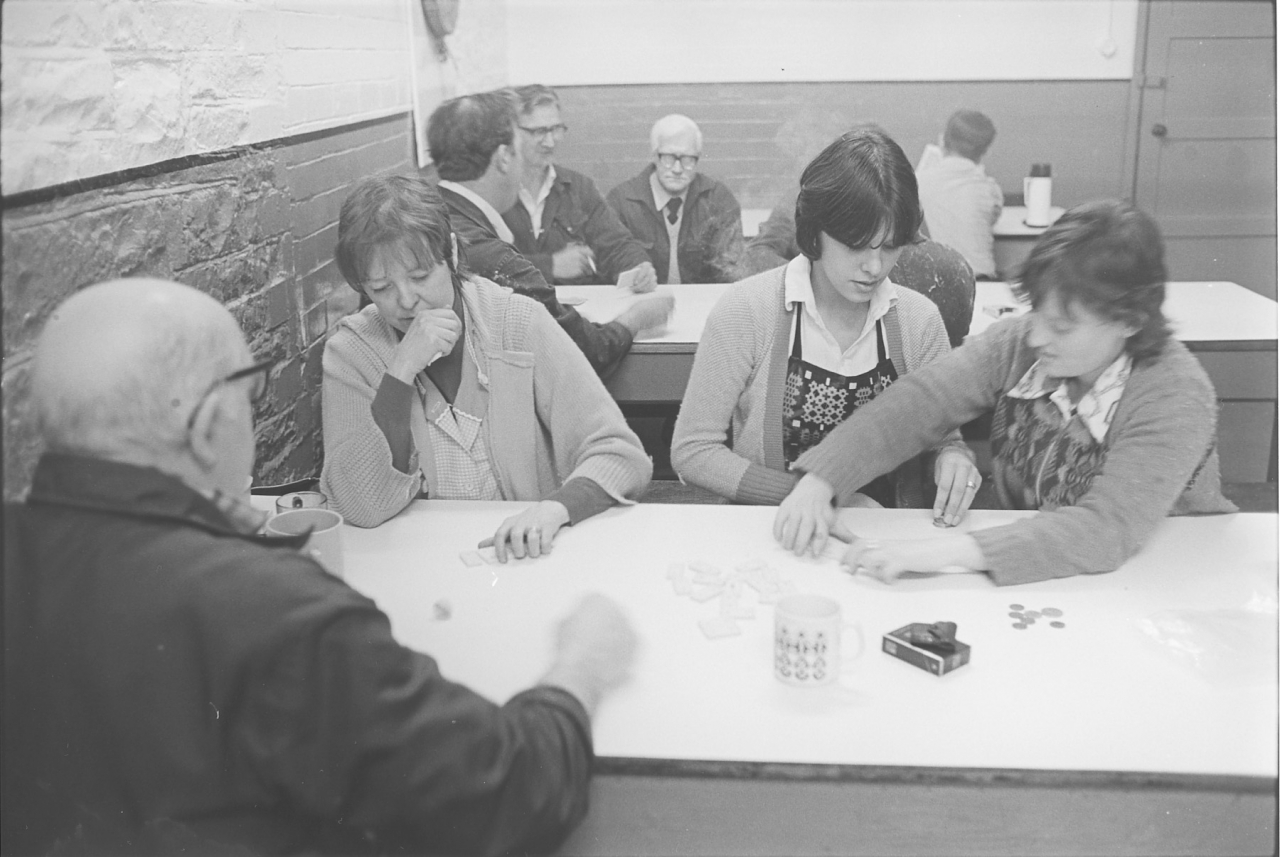
R- That's me yes, that’s against the wall, studying.
This is lunch hour is it?
R- This is lunch hour yes. Where we have a game of dominoes when we’ve finished our dinner, for 5p. a game. Where I usually lose anyway! Me studying doesn’t do me a right lot of good really. Sometimes I win but….
Do you? It’s interesting that today, eleventh of April, there aren't many people on that photograph who are still here are there?
R - No there aren't, no. There's one, two, three, four, five of them are gone already. Because as I’ve said earlier we are all being, the mill’s closing you know and we are all being made redundant. Some of them have found jobs elsewhere and the two girls that are sat next to me, they've gone working over at the other mills.
Yes now it’s interesting as in fact they have moved them to another mill and they are not making them redundant. When I say to another mill it’s still part of Whittaker’s isn't it.
R- Yes well they haven’t much redundancy to come, because they’re very young you know .. like they don’t pay redundancy up to eighteen years of age and then from eighteen to twenty one it’s only half a week’s wage. Well both these girls are only twenty two I think so they had hardly anything to come at all, it was a matter of something and nothing you know? So I think he’s found them a job on account of this like.
I believe Pat, is this Maureen?
(750)
R- Ann at the end. Yes.
I don't really know Ann, but I believe Pat was particularly good at her job.
R - Yes she was, very good yes.
I was just wondering if that was perhaps the reason that made them move them as much as their age.
R- Well I don't think that was the main reason you know because she hasn’t gone over there doing the same job that she was doing here. It’s a different job entirely what she’s gone doing you know but she’s a good worker.
Yes. And the gentleman behind you .. and facing this way with the glasses, he is in the card room.
R- He is the under carder, Joe Pilling, and sat next to him, that's Charlie Robinson one of the grinders, he’s finished now, he’s gone working outside, on this motorway I think, running errands for the men and brewing up for them and what have you.
It's a shame isn’t it.
R- Yes it’s a shame.
Although this is all brick walls everything .. I was impressed when I first came in how smartly painted everything was.
R- Yes, well they have painters contracted to the firm you know. To do all the painting inside the mills and what not Smith’s painters.
It certainly is sort of clean and kept nice and smart looking. As well as is practical to do in a place that, obviously you are not going to have wallpaper on the wall.
R- No it’s very clean, very clean compared like you said to some of the mills you know.
And do you get food provided for you?
R – We’ve lunch provided, yes. Morning, early morning toast and twelve o’clock a dinner, chips and sometimes potato pies, puddings, roast beef, steak and kidney pie, beef burger. We have a variety but it’s pretty good really you know.
Do you have to pay for that?
R- Oh yes we have to pay for our lunches, and dinners.
But I would guess it must be subsidised a little bit do you think?
R- I’m not sure, it’s a catering firm. It's not Whittaker's own staff now. It used to be but this catering firm took it over. Shaw’s Catering and they…
(800)(35 min)
What, what sort of price do you pay for, say, steak and kidney pie and chips?
R- Thirty, thirty odd pence.
Oh well I’d say that that's probably subsidised.
R - Yes, would you think?
I would think to,
R – Toast, just a slice of toast at morning six pence for one slice you know?
Toast and butter?
R- Yes. If you have two toasts with cheese on that’s nineteen and a half pence.
Well that’s sort of café prices isn’t it but I would say the steak and kidney pie and chips might be a bit subsidised.
R – Yes.
Very good. There must be all sorts of rumours going around and everybody must have their own feelings about it but who do you think or what do you think is to blame for the closing down of this mill directly and the whole declining of the Industry?
R – Well I think a lot of it's the foreign imports but not all of it. I think partly it’s because the mill owners just haven't kept up to date with the machinery for the cloth that these buyers want you know. Like there’s a sale for a lot of this synthetic cloth now. Well you just can't make it on this machinery you know. You see if people don’t move with the times they fall behind and then they’re bound to close, aren't they. But I think that anyway, I think like I said that some of it's due to these foreign imports but not all of it. I think the bosses, the mill owner his self are partly to
blame for not investing in the business you know? I mean all this machinery
that we have here is all old machinery, years old you know. They must have
had a lot of it when the mill opened I think.
That was 1847 wasn't it?
R – Yes. You see you can’t live off it for ever can you. You’ve got to [invest] if you're taking out you’ve got to put back in haven't you.
(850)
And of course here at this mill not only is it all pure cotton, it’s waste cotton isn’t it.
R – Yes.
In other words, as I understand it, it’s the waste that comes from fine cotton spinning, am I right?
R- yes. They make bales here and sell those you see. We buy them to use but we also sell them you know.
When you say bales you mean the cotton fibres that have been blended but not carded, yes?
R - Yes.
Do you know what this is used to make? This spun yarn that goes out from here. Do you know what it’s used to make?
R- It goes over to the other mill at Grane Road to the weavers, and they weave it then into cloth and they make sheets and towels. They’re making towels over there now. I don't know whether they make those out of our yarn you know. In fact I don't think they do, I think they make those on those big German Sulzer looms and they have stuff from Flash Mill for running them I think, big cones. Cones I think. I’m not sure you know.
Paper cones or Welsh Hat do you mean?
R - Not Welsh Hat no. They’re like cardboard you know.
Oh, cheeses are they called?
R - Yes but what wind is used .. I think they re-wind them on to cops, when they go over to Grane Road I think they re-wind them on to cops, and then they go into the Sulzer Shed you know.
Just before we finish Glenys, and thank you very much for doing all that but I just thought perhaps I ought to, for the record, put it straight. I asked you whether you had always lived in the Valley but I didn't ask you where you were born.
R- I were born in Rossendale General Hospital on the 7th of September 1942.
(900)
1942, that was going to be my next question, when you were born if you didn’t mind me asking you. Just so that we know the sort of range of ages of people working in the mill and how long you've been here. And thank you very much.
R – Right, you're welcome.
SCG/25 June 2003
5,323 words.
